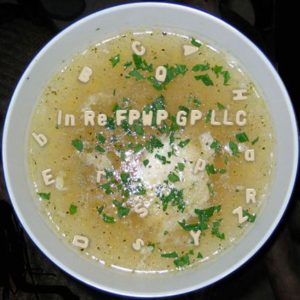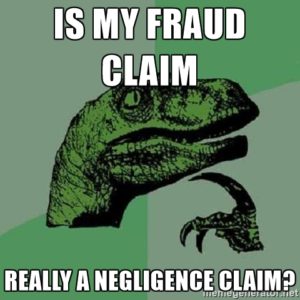 Dahlheimer sought a writ of injunction in the court of appeals to stay proceedings involving a receivership about the sale of a home. The Fifth Court found that it lacked jurisdiction, noting that its injunctive power is limited to “jurisdiction over the subject matter of a pending appeal,” and that “[t]he power to grant a temporary writ of injunction to prevent damages which would otherwise flow to alitigant who has an apppeal pending rests exclusively with the trial court.” In re Dahlheimer, No. 05-17-00556-CV (June 8, 2017) (mem. op.)
Dahlheimer sought a writ of injunction in the court of appeals to stay proceedings involving a receivership about the sale of a home. The Fifth Court found that it lacked jurisdiction, noting that its injunctive power is limited to “jurisdiction over the subject matter of a pending appeal,” and that “[t]he power to grant a temporary writ of injunction to prevent damages which would otherwise flow to alitigant who has an apppeal pending rests exclusively with the trial court.” In re Dahlheimer, No. 05-17-00556-CV (June 8, 2017) (mem. op.)
 A quick reminder on summary judgment procedure appears in Autosource Dallas LLC v. Addison Aeronautics LLC:
A quick reminder on summary judgment procedure appears in Autosource Dallas LLC v. Addison Aeronautics LLC:
- “A movant is required to provide twenty-one days’ notice when setting a summaryjudgment. This twenty-one day requirement is designed to give
the nonmovant sufficient time to prepare and file a response for the original setting.” - “The twenty-one-day notice requirement does not however apply to a resetting of the hearing, so long as the nonmovant received twenty-one days’ notice of the original hearing.”
- For a recheduled hearing, the movant “needed only to give reasonable notice that the hearing on its summary judgment had been rescheduled. Reasonable notice means at least seven days before the hearing because a nonmovant
may only file a response to a motion for summary judgment not later than seven days prior to the date of the hearing without leave of court.”
No. 05-16-00838-CV (June 9, 2017) (mem. op.)
The high-profile mandamus case of In re: Paxton provides a general reminder about geographic bounds on Texas trial courts: “Jurisdiction over the cases vested immediately in the Harris County district courts when respondent signed the transfer order. The Texas Constitution does not allow the 416th Judicial District Court to sit outside of the Collin County seat, McKinney, absent express statutory authority. Tex. Const. art. V, § 7. The only authority by which this may occur is [Code of Criminal Procedure] article 31.09, which requires consent of the parties. Thus, absent effective application of article 31.09, respondent may not continue to preside over the cases or utilize the services of the court reporter, court coordinator, or clerk of the court of original venue. Relator has unequivocally stated that he did not consent to respondent continuing to preside over the cases or otherwise acting in accordance with article 31.09, and no written consent appears in our record. Accordingly, under the plain language of the statute, respondent is without authority to continue to preside over the cases and is also without authority to issue orders or directives maintaining the case files in Collin County. Consequently, all orders issued by respondent after he signed the April 11, 2017 transfer order are void.” No. 05-17-00507-CV (May 30, 2017).
 Last Friday, the Texas Supreme Court denied mandamus relief in a high-profile dispute about the proper format in which to produce electronic records, but provided extensive guidance about the framework and factors that should decide such disputes, and remanded for reconsideration in light of that guidance. In a nutshell: “Under our discovery rules, neither party may dictate the form of electronic discovery. The requesting party must specify the desired form of production, but all discovery is subject to the proportionality overlay embedded in our discovery rules and inherent in the reasonableness standard to which our electronic-discovery rule is tethered. The taproot of this discovery dispute is whether production in native format is reasonable given the circumstances of this case. Reasonableness and its bedfellow, proportionality, require a case-by-case balancing of jurisprudential considerations,which is informed by factors the discovery rules identify as limiting the scope of discovery and geared toward the ultimate objective of “obtain[ing] a just,fair, equitable and impartial adjudication” for the litigants “with as great expedition and dispatch at the least expense . . . as may be practicable.” In re State Farm Lloyds, No. 15-903 (Tex. May 26, 2017).
Last Friday, the Texas Supreme Court denied mandamus relief in a high-profile dispute about the proper format in which to produce electronic records, but provided extensive guidance about the framework and factors that should decide such disputes, and remanded for reconsideration in light of that guidance. In a nutshell: “Under our discovery rules, neither party may dictate the form of electronic discovery. The requesting party must specify the desired form of production, but all discovery is subject to the proportionality overlay embedded in our discovery rules and inherent in the reasonableness standard to which our electronic-discovery rule is tethered. The taproot of this discovery dispute is whether production in native format is reasonable given the circumstances of this case. Reasonableness and its bedfellow, proportionality, require a case-by-case balancing of jurisprudential considerations,which is informed by factors the discovery rules identify as limiting the scope of discovery and geared toward the ultimate objective of “obtain[ing] a just,fair, equitable and impartial adjudication” for the litigants “with as great expedition and dispatch at the least expense . . . as may be practicable.” In re State Farm Lloyds, No. 15-903 (Tex. May 26, 2017).
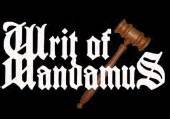 The Texas Supreme Court’s newfound enthusiasm for mandamus review of orders granting motions for new trial after a jury trial (see, e.g., In re: United Scaffolding, 377 S.W.3d 685 (Tex. 2012)) has not been embraced by the courts of appeal (including Dallas) to orders setting aside a default judgment, or orders granting a new trial following a bench trial. A thorough summary of the Fifth Court’s opinions on those subjects appears in In re: Walker, No. 05-17-00404-CV (May 23, 2017) (mem. op.)
The Texas Supreme Court’s newfound enthusiasm for mandamus review of orders granting motions for new trial after a jury trial (see, e.g., In re: United Scaffolding, 377 S.W.3d 685 (Tex. 2012)) has not been embraced by the courts of appeal (including Dallas) to orders setting aside a default judgment, or orders granting a new trial following a bench trial. A thorough summary of the Fifth Court’s opinions on those subjects appears in In re: Walker, No. 05-17-00404-CV (May 23, 2017) (mem. op.)
New Local Rule 5, which became effective in May 2017, bridges a “gap” in the Texas Rules of Appellate Procedure about the briefing schedule when both parties have appealed.
 The case of In re Bolt reminds when a party can seek mandamus relief to obtain a ruling on a motion. On the one hand, because “[m]andamus is appropriate to compel the performance of a ministerial duty,” it follows that “[a] trial jduge must consider and rule on a motion brought to the court’s attention within a reasonable amount of time, and a writ of mandamus may be issued to compel the trial court to rule in such instances.” But, as is required in other contexts where mandamus may be appropriate, the matter must be presented to the trial court: “To be properly filed and timely presented, a motion must be presentedd to a trial court at a time when the court has authority to act on the motion. The mere filing of a motion with the trial court clerk does not equate to a request that the trial court rule on the motion.” No. 05-17-00495-CV (May 22, 2017) (mem. op.)
The case of In re Bolt reminds when a party can seek mandamus relief to obtain a ruling on a motion. On the one hand, because “[m]andamus is appropriate to compel the performance of a ministerial duty,” it follows that “[a] trial jduge must consider and rule on a motion brought to the court’s attention within a reasonable amount of time, and a writ of mandamus may be issued to compel the trial court to rule in such instances.” But, as is required in other contexts where mandamus may be appropriate, the matter must be presented to the trial court: “To be properly filed and timely presented, a motion must be presentedd to a trial court at a time when the court has authority to act on the motion. The mere filing of a motion with the trial court clerk does not equate to a request that the trial court rule on the motion.” No. 05-17-00495-CV (May 22, 2017) (mem. op.)
Federal law, but highly relevant to the local corporate community – the Supreme Court’s unanimous May 22 decision in TC Heartland LLC v. Kraft Foods Group Brands LLC holds: “As applied to domestic corporations, ‘reside[nce]’ in [28 U.S.C.] § 1400(b) refers only to the State of incorporation.”
 Emergency Medical Training Services sued Sheila Elliott for breaching various non-disclosure obligations in her complaints to state regulators. Elliott moved to dismiss under the Texas anti-SLAPP statute; the district court denied her motion, and the Fifth Court reversed and remanded for dismissal of the case in her favor.
Emergency Medical Training Services sued Sheila Elliott for breaching various non-disclosure obligations in her complaints to state regulators. Elliott moved to dismiss under the Texas anti-SLAPP statute; the district court denied her motion, and the Fifth Court reversed and remanded for dismissal of the case in her favor.
The Court used a standard two-step analysis. As to the first step, Elliott met her burden to show that EMTS’s claim was based on her exercise of free speech rights – a matter, the Court ruled, that was not affected by whether she had entered an NDA. As to the second step, EMTS failed to meet its burden to establish a prima facie case fo each element of its contract claim, as its evidence of damage was too conclusory. Elliott v. S&S Emergency Training Solutions, Inc., No. 05-16-01373-CV (May 16, 2017) (mem. op.)
In a quick break from Texas state practice – for a recent CLE presentation, I prepared the attached one-page chart to summarize the Fifth Circuit’s recent holdings about discovery.
The arbitration clause in Employee Solutions v. Wilkerson said, in part, that it applied to “. . . any and all claims challenging the existence, validity or enforceability of this [agreement] (in whole or in part) or challenging the applicability of this [agreement] to a particular dispute or claim.” To get around this broad language, the party opposing arbitration contended that it did not reach a “purely procedural” matter – the alleged failure to serve a written demand for arbitration on him and file it with the arbitral authority within the statute of limitations for negligence. The Fifth Court disagreed, noting the parties’ dispute as to whether this matter was a condition precedent to arbitration, which brought it squarely within the above language. No. 05-16-00283-CV (May 10, 2017) (mem. op.)
 In the legal malpractice case of Ashton v. KoonsFuller, P.C., the Fifth Court affirmed a summary judgment for the defendant law firm. Among other issues addressed, the Court criticized the testimony of the plaintiff’s expert about the defendant’s billing, providing an illustration of the commonly-litigated Daubert/Robinson issue about whether an expert adequately considered alternatives to his or her conclusion: “[W]hile Hill disagrees with the amount of time KoonsFuller spent on discovery matters and preparing for mediation, the affidavit does not state how much time would have been reasonable. Similarly, Hill complains about the number of lawyers and legal assistants billing for those services, but does not suggest what an appropriate number would be.” No. 05-16-00130-CV (May 10, 2017) (mem. op.)
In the legal malpractice case of Ashton v. KoonsFuller, P.C., the Fifth Court affirmed a summary judgment for the defendant law firm. Among other issues addressed, the Court criticized the testimony of the plaintiff’s expert about the defendant’s billing, providing an illustration of the commonly-litigated Daubert/Robinson issue about whether an expert adequately considered alternatives to his or her conclusion: “[W]hile Hill disagrees with the amount of time KoonsFuller spent on discovery matters and preparing for mediation, the affidavit does not state how much time would have been reasonable. Similarly, Hill complains about the number of lawyers and legal assistants billing for those services, but does not suggest what an appropriate number would be.” No. 05-16-00130-CV (May 10, 2017) (mem. op.)
 The new “permissive appeal” procedure has not led to a lot of permissive, interlocutory appeals; another example of that trend appears in Oklahoma Specialty Ins. Co. v. St. Martin de Porres, Inc. The parties stipulated to damages, the trial court found the policy ambiguous and thus interpreted in a certain way, and said it would follow whatever the Fifth Court decided about that interpretation. The Court declined to hear the case, finding: “Given the posture of this case following the trial court’s rulings and the parties’ stipulations, we conclude a permissive appeal will not materially advance the ultimate termination of the litigation by considerably shortening the time, effort, and expense involved in obtaining a final judgment. (applying Tex. Civ. Prac. & Rem. Code § 51.014(d).
The new “permissive appeal” procedure has not led to a lot of permissive, interlocutory appeals; another example of that trend appears in Oklahoma Specialty Ins. Co. v. St. Martin de Porres, Inc. The parties stipulated to damages, the trial court found the policy ambiguous and thus interpreted in a certain way, and said it would follow whatever the Fifth Court decided about that interpretation. The Court declined to hear the case, finding: “Given the posture of this case following the trial court’s rulings and the parties’ stipulations, we conclude a permissive appeal will not materially advance the ultimate termination of the litigation by considerably shortening the time, effort, and expense involved in obtaining a final judgment. (applying Tex. Civ. Prac. & Rem. Code § 51.014(d).
I am speaking on the topic “Ethics 2017: Recent Federal Court Decisions to Know” on Friday, May 5, to the Plano Bar Association (noon at Palio’s Pizza, yum) – here is the PowerPoint that I will be using.
Plaintiff sued two insurance companies, headquartered out-of-state, who produced evidence that their business was limited to out-of-state activity. As to an allegation that the companies and their agents met in Toront o where they “conspired to forge [Plaintiff’s signature,” the Court reminded that “the assertion of personal jurisdiction over a nonresident defendant may not be based solely upon the effects or consequences of an alleged conspiracy with a resident in the forum state.” Friend v. Acadia Holding Corp., No. 05-16-00286-CV (April 27, 2017) (applying Nat’l Indus. Sand Ass’n v. Gibson, 897 S.W.2d 769, 773 (Tex. 1995)).
o where they “conspired to forge [Plaintiff’s signature,” the Court reminded that “the assertion of personal jurisdiction over a nonresident defendant may not be based solely upon the effects or consequences of an alleged conspiracy with a resident in the forum state.” Friend v. Acadia Holding Corp., No. 05-16-00286-CV (April 27, 2017) (applying Nat’l Indus. Sand Ass’n v. Gibson, 897 S.W.2d 769, 773 (Tex. 1995)).
Jones sued a TV production company, alleging that he was shot at and received death threats as a result of his appearance (even t hough blurred and voice-altered) on “The First 48,” a show about homicide investigations. The company did not prevail on its motion to dismiss based on the Texas anti-SLAPP statute: “The plain language of section 27.010(c) excludes legal actions seeking recovery for bodily injury. . . . Mr. Jones’s negligence claim seeks to recover for the bodily injuries—four gunshot wounds—that he claims he sustained as a result of Kirkstall’s negligence in editing and producing its program. Without expressing any opinion on the merits of his claim, we conclude that Mr. Jones has shown that it is exempted from application of the TCPA.” Kirkstall Road Enterprises v. Jones, No. 05-16-00859-CV (April 27, 2017).
hough blurred and voice-altered) on “The First 48,” a show about homicide investigations. The company did not prevail on its motion to dismiss based on the Texas anti-SLAPP statute: “The plain language of section 27.010(c) excludes legal actions seeking recovery for bodily injury. . . . Mr. Jones’s negligence claim seeks to recover for the bodily injuries—four gunshot wounds—that he claims he sustained as a result of Kirkstall’s negligence in editing and producing its program. Without expressing any opinion on the merits of his claim, we conclude that Mr. Jones has shown that it is exempted from application of the TCPA.” Kirkstall Road Enterprises v. Jones, No. 05-16-00859-CV (April 27, 2017).
 The recent memorandum opinion in In re NCH Corp reminds of two basic points about mandamus practice.
The recent memorandum opinion in In re NCH Corp reminds of two basic points about mandamus practice.
- In a mandamus situation arising from the threatened disclosure of trade secrets: “No adequate appellate remedy exists if a trial court orders a party to produce privileged trade secrets absent a showing of necessity. In re Bass, 113 S.W.3d 735, 745 (Tex. 2003) (orig. proceeding) (citing In re Cont’l Gen. Tire, Inc., 979 S.W.2d 609, 615 (Tex. 1998) (orig. proceeding)). Further, a trial court abuses its discretion when it erroneously compels production of trade secrets without a showing that the information is ‘material and necessary.’ Id. at 738, 743.”
- The Fifth Court is using slightly revised “standard” language when denying mandamus relief in a short opinion: “To be entitled to mandamus relief, a relator must show both that the trial court has clearly abused its discretion and that relator has no adequate appellate remedy. In re Prudential Ins. Co., 148 S.W.3d 124, 135–36 (Tex. 2004) (orig. proceeding). . . . Based on the record before us, we conclude relator has not shown it is entitled to the relief requested. Accordingly, we DENY relator’s petition for writ of mandamus. See Tex. R. App. P. 52.8(a) (the court must deny the petition if the court determines relator is not entitled to the relief sought).
No. 05-17-00360-CV (Apr. 25, 2017) (mem. op.)
 Smith intervened in a case after a judgment had been entered; the trial court granted a motion to strike his intervention. Resolving a tangled web of procedural issues, the Fifth Court held that (1) the striking of his intervention was not appealable before final judgment; (2) Smith’s appeal was limited to the merits of his intervention, not the claims of others; and (3) Smith’s filing of a motion for new trial extended the appellate deadlines. Smith v. City of Garland, No. 05-16-00454-CV (Apr. 20, 2017).
Smith intervened in a case after a judgment had been entered; the trial court granted a motion to strike his intervention. Resolving a tangled web of procedural issues, the Fifth Court held that (1) the striking of his intervention was not appealable before final judgment; (2) Smith’s appeal was limited to the merits of his intervention, not the claims of others; and (3) Smith’s filing of a motion for new trial extended the appellate deadlines. Smith v. City of Garland, No. 05-16-00454-CV (Apr. 20, 2017).
The Fifth Court reversed an award of lost profits in Radiant Financial, Inc. v. Bagby, which allegedly arose from improper customer solicitation about an insurance product, noting, inter alia: “Radiant admits the five policies [the expert] used in his estimate were not available at the time Radiant released the fifty-nine investors. Radiant argues that it had sufficient policies availale, but none of the investors chose to invest in those poliicies, even though Radiant presented those policies to its investors.” The Court concluded: “[T]o conclude the nineteen investors would have invested with Radiant instead of Paladin, we would be required to stack assumption upon assumption, which we will not do.” No. 05-16-00268-CV (April 18, 2017) (mem. op.)
 The Fifth Court affirmed summary judgment for D Magazine in a defamation suit by a former volunteer, finding that most of the statements at issue were unactionable opinions or accurate statements of fact. Summarizing the underlying principles of free speech, the opinion reminds that a “rhetorical flourish” that is “merely unflattering, abusive, annoying, irksome, or embarrassing, or that only hurts the plaintiff’s feelings, is not actionable.” The court lacked appellate jurisdiction over part of a related appeal by the Dallas Symphony, since it involved the denial of a summary judgment about a tortious interference claim rather then free speech issues, although the Court was able to address the civil conspiracy claim against the Symphony. D Magazine Partners LP v. Reyes, No. 05-16-00294-CV (April 18, 2017) (mem. op.)
The Fifth Court affirmed summary judgment for D Magazine in a defamation suit by a former volunteer, finding that most of the statements at issue were unactionable opinions or accurate statements of fact. Summarizing the underlying principles of free speech, the opinion reminds that a “rhetorical flourish” that is “merely unflattering, abusive, annoying, irksome, or embarrassing, or that only hurts the plaintiff’s feelings, is not actionable.” The court lacked appellate jurisdiction over part of a related appeal by the Dallas Symphony, since it involved the denial of a summary judgment about a tortious interference claim rather then free speech issues, although the Court was able to address the civil conspiracy claim against the Symphony. D Magazine Partners LP v. Reyes, No. 05-16-00294-CV (April 18, 2017) (mem. op.)
Defendants sought review of a post-answer default judgment by restricted appeal. Unfortunately for them, “the record is silent regarding whether notice of the final hearing date was sent . . . . ” They thus failed to show error on the face of the record, as required in a restricted appeal, because “absence in the record of any proof that notice . . . was sent to a party is ‘just that–an absence of proof of error.” Odela Group LLC v. Double-R Walnut Management LLC, No. 05-16-00206-CV (April 12, 2017) (mem. op.) (applying and quoting Gold v. Gold, 145 S.W.3d 212 (Tex. 2004)).
 AWD brought a flat tire to Logan & Son for repairs. Jaimes, who worked for Logan * Son, was injured while working on the tire, and contended that his employer, Logan & Son, was an independent contractor of AWD. The Fifth Court disagreed: “The evidence showed that AWD was simply a customer who did not have a right to control any aspect of Logan and Son’s work. When Jaimes was asked at his deposition what he was claiming AWD did to cause his injuries, he [only] said, ‘they brought the truck.'” Jaimes v. Lozano, No. 05-16-00165-CV (April 14, 2017) (mem. op.)
AWD brought a flat tire to Logan & Son for repairs. Jaimes, who worked for Logan * Son, was injured while working on the tire, and contended that his employer, Logan & Son, was an independent contractor of AWD. The Fifth Court disagreed: “The evidence showed that AWD was simply a customer who did not have a right to control any aspect of Logan and Son’s work. When Jaimes was asked at his deposition what he was claiming AWD did to cause his injuries, he [only] said, ‘they brought the truck.'” Jaimes v. Lozano, No. 05-16-00165-CV (April 14, 2017) (mem. op.)
In Viveri Youth Service v. Orme, the Fifth Court dismissed an appeal for lack of a final judgment. While the docket sheet indicated the case had been closed, the Court observed: “The last order, however, contains no language of finality or other indication the case was closed. While the trial court’s docket sheet reflects the case was closed, a docket sheet entry does not constitute a judgment or other appealable order of the trial court.” No. 05-17-00002-CV (April 11, 2017) (mem. op.)
 A mandamus petition challenged an order allowing a “court-supervised winding up” of an LLC that owned over 700 acres of undeveloped land in Denton County. As to the procedural posture of the case, the Fifth Court obseved: “[M]andamus relief is proper to the extent the winding-up order permits execution before the entry of a final, appealable judgment.” On the merits, the court concluded that this order had that effect, “because if SRE is wound up and the property sold in the interim, [Petitioner]’s property rights and purported right to continue the business will be lost forever.” In re Spiritas, No. 05-16-00791-CV (Apr. 6, 2017) (mem. op.)
A mandamus petition challenged an order allowing a “court-supervised winding up” of an LLC that owned over 700 acres of undeveloped land in Denton County. As to the procedural posture of the case, the Fifth Court obseved: “[M]andamus relief is proper to the extent the winding-up order permits execution before the entry of a final, appealable judgment.” On the merits, the court concluded that this order had that effect, “because if SRE is wound up and the property sold in the interim, [Petitioner]’s property rights and purported right to continue the business will be lost forever.” In re Spiritas, No. 05-16-00791-CV (Apr. 6, 2017) (mem. op.)
 The long-running dispute between the City of Dallas and the Topletz family, which owns a number of residential rental properties, reappeared in the case of Topletz v. City of Dallas. The Fifth Court substantially affirmed a temporary injunction in favor of the City and a class of tenants, reversing as to one provision that “prohibits appellants from raising rent, properly initiating eviction proceedings, or evicting . . . without leave of the trial court.” This provision was overly broad because it “enjoins activities the appellants otherwise have a legal right to perform . . . .” No. 05-16-00741-CV (April 6, 2017) (mem. op.) (citing, inter alia, Webb v. Glenbrook Owners Ass’n, Inc., 298 S.W.3d 374 (Tex. App.–Dallas 2009, no pet.)).
The long-running dispute between the City of Dallas and the Topletz family, which owns a number of residential rental properties, reappeared in the case of Topletz v. City of Dallas. The Fifth Court substantially affirmed a temporary injunction in favor of the City and a class of tenants, reversing as to one provision that “prohibits appellants from raising rent, properly initiating eviction proceedings, or evicting . . . without leave of the trial court.” This provision was overly broad because it “enjoins activities the appellants otherwise have a legal right to perform . . . .” No. 05-16-00741-CV (April 6, 2017) (mem. op.) (citing, inter alia, Webb v. Glenbrook Owners Ass’n, Inc., 298 S.W.3d 374 (Tex. App.–Dallas 2009, no pet.)).
 The case of MacFarland v. Le-Vel Brands involved a blog post on the website “Lazy Man and Money,” which was critical of a multi-level marketing company that sells dietary supplements. The trial court denied the defendant’s motion to dismiss under the Texas anti-SLAPP statute and the Fifth Court reversed, finding: (1) the suit involved the blogger’s speech; (2) the “commercial speech” exception did not apply; and (3) the plain
The case of MacFarland v. Le-Vel Brands involved a blog post on the website “Lazy Man and Money,” which was critical of a multi-level marketing company that sells dietary supplements. The trial court denied the defendant’s motion to dismiss under the Texas anti-SLAPP statute and the Fifth Court reversed, finding: (1) the suit involved the blogger’s speech; (2) the “commercial speech” exception did not apply; and (3) the plain tiff could not establish damages for either business disparagement or defamation. (On that subject, compare the recent case from the Fifth Court of Glassdoor v. Andra Group, which did find sufficient evidence of damage.) The opinion carefully reviews the leading recent authorities on the scope of these provisions of the statute. The case was remanded for further proceedings, including consideration of the defendant’s attorneys’ fees and costs. No. 05-16-00672 (March 23, 2017) (mem. op.)
tiff could not establish damages for either business disparagement or defamation. (On that subject, compare the recent case from the Fifth Court of Glassdoor v. Andra Group, which did find sufficient evidence of damage.) The opinion carefully reviews the leading recent authorities on the scope of these provisions of the statute. The case was remanded for further proceedings, including consideration of the defendant’s attorneys’ fees and costs. No. 05-16-00672 (March 23, 2017) (mem. op.)
A law firm moved for summary judgment as to an unpaid balance, attaching an affidavit which in turn had several invoices attached. The Fifth Court reversed a summary judgment for the firm, noting that the affidavit did not (1) attach a complete set of invoices, (2) was missing entire pages, (3) only reflected that they were sent to one of the relevant parties, and (4) did not attach the computer records used to calculate the net balance. Thus, “[w]e conclude that without the invoices or computer records [the witness] relied on to support his affidavit, the affidavit was conclusory.” Acrey v. Kilgore & Kilgore PLLC, No. 05-15-01229-CV (March 30, 2017) (mem. op.)
 Verveba Communications and a former employee, Jewell Thomas, settled a dispute about travel expenses after a JP court trial with this release: “each party hereby: (1) releases all claims against the other; (ii) waives his/its right to file a motion for new trial, [and] (iii) waives his/its right to appeal the [JP court] judgment . . . .” Jewell then brought new claims, beyond the contract claim litigated in JP court, and the Fifth Court affirmed their dismissal: “None of these cases [cited by Thomas] held that the release must identify each claim or cause of action by name to be effective and, in fact, none of the releases in these cases identified the claims being released specifically by name.” Thomas v. Verveba Telecom, LLC, No. 05-16-00123-CV (March 31, 2017) (mem. op.)
Verveba Communications and a former employee, Jewell Thomas, settled a dispute about travel expenses after a JP court trial with this release: “each party hereby: (1) releases all claims against the other; (ii) waives his/its right to file a motion for new trial, [and] (iii) waives his/its right to appeal the [JP court] judgment . . . .” Jewell then brought new claims, beyond the contract claim litigated in JP court, and the Fifth Court affirmed their dismissal: “None of these cases [cited by Thomas] held that the release must identify each claim or cause of action by name to be effective and, in fact, none of the releases in these cases identified the claims being released specifically by name.” Thomas v. Verveba Telecom, LLC, No. 05-16-00123-CV (March 31, 2017) (mem. op.)
 An attorney paid a sanction and then challenged the sanctions order as part of the appeal from the final judgment in the action. In reviewing an objection based on mootness, the Fifth Court observed that while an appeal becomes moot “when a judgment debtor voluntarily pays and satisfied a judgment rendered against him,” the purpose of that rule is “to prevent appellants from misleading their opponents into believing a controversy is over when it is not.” Thus, “payment on a judgment will not moot an appeal of that judgment if the judgment debtor clearly expresses an intent that he intends to exercise his right of appeal and appellate relief is not futile.” Here, before the attorney paid the sanction, the other side had notice of his intent to appeal when payment was made, so the appeal was justiciable. Kamel v. AdvoCare Int’l, L.P., No. 05-16-00433-CV (March 28, 2017) (mem. op.)
An attorney paid a sanction and then challenged the sanctions order as part of the appeal from the final judgment in the action. In reviewing an objection based on mootness, the Fifth Court observed that while an appeal becomes moot “when a judgment debtor voluntarily pays and satisfied a judgment rendered against him,” the purpose of that rule is “to prevent appellants from misleading their opponents into believing a controversy is over when it is not.” Thus, “payment on a judgment will not moot an appeal of that judgment if the judgment debtor clearly expresses an intent that he intends to exercise his right of appeal and appellate relief is not futile.” Here, before the attorney paid the sanction, the other side had notice of his intent to appeal when payment was made, so the appeal was justiciable. Kamel v. AdvoCare Int’l, L.P., No. 05-16-00433-CV (March 28, 2017) (mem. op.)
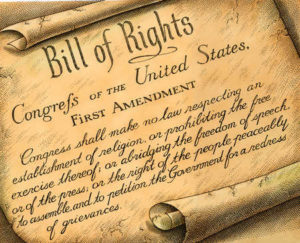 In Glassdoor Inc. v. Andra Group LP, the Fifth Court affirmed an order granting a Rule 202 petition about online reviews of a business as an employer, offering several pointers for the handling of such petitions:
In Glassdoor Inc. v. Andra Group LP, the Fifth Court affirmed an order granting a Rule 202 petition about online reviews of a business as an employer, offering several pointers for the handling of such petitions:
- The trial judge limited the scope of the examination to two posts, and specific items within them;
- The movant established its potential business disparagement damages with three affidavits about the effect of the posts on its recruiting;
- The statements at issue went beyond “hyperbole or mere personal opinion” to make specific “accusations of illegal conduct that are capable of being proved true or false”; and
- The First Amendment rights of the anonymous reviewers to speak anonymously “must be balanced against the right of others to hold accountable those who engage in speech not protected by the First Amendment.”
A “mirror image” anti-SLAPP motion was properly rejected for the same reasons that the Rule 202 petition was granted. No. 05-16-00189-CV (March 24, 2017) (mem. op.)
 If Dr. McCoy made his famous pronouncement, not as to an Enterprise crew member in a red shirt, but during litigation about another defendant by filing a “suggestion of death,” would he make a general appearance in that litigation? The Fifth Court answered “no” in Hegwer v. Edwards, primarily citing a line of cases holding that making and filing a Rule 11 agreement does not amount to a general appearance. No. 05-15-01464-CV (March 22, 2017).
If Dr. McCoy made his famous pronouncement, not as to an Enterprise crew member in a red shirt, but during litigation about another defendant by filing a “suggestion of death,” would he make a general appearance in that litigation? The Fifth Court answered “no” in Hegwer v. Edwards, primarily citing a line of cases holding that making and filing a Rule 11 agreement does not amount to a general appearance. No. 05-15-01464-CV (March 22, 2017).
“I-35 argues that, although the guaranty itself does not specify an interest rate, the guaranty incorporates the Note and the two must be read together. We agree.” Interstate 35-Chisam Road LP v. Moyaedi, No. 05-16-00196-CV (March 20, 2017) (mem. op.)
In D Magazine Partners LP v. Rosenthal, reviewing the work of the Dallas Court of Appeals in a high-profile anti-SLAPP case, the Texas Supreme Court observed about Wikipedia:
“Given the arguments both for and against reliance on Wikipedia, as well as the variety of ways in which the source may be utilized, a bright-line rule is untenable. Of the many concerns expressed about Wikipedia use, lack of reliability is paramount and may often preclude its use as a source of authority in opinions. At the least, we find it unlikely Wikipedia could suffice as the sole source of authority on an issue of any significance to a case. That said, Wikipedia can often be useful as a starting point for research purposes. In this case, for example, the cited Wikipedia page itself cited past newspaper and magazine articles that had used the term ‘welfare queen’ in various contexts and could help shed light on how a reasonable person could construe the term.”
But, as a matter of the relevant substantive law, and the nature of Wikipedia, t he Texas Supreme Court found overreliance on a Wikipedia entry when “the court of appeals utilized Wikipedia as its primary source to ascribe a specific, narrow definition to a single term that the court found significantly influenced the article’s gist. Essentially, the court used the Wikipedia definition as the lynchpin of its analysis on a critical issue. . . . ”
he Texas Supreme Court found overreliance on a Wikipedia entry when “the court of appeals utilized Wikipedia as its primary source to ascribe a specific, narrow definition to a single term that the court found significantly influenced the article’s gist. Essentially, the court used the Wikipedia definition as the lynchpin of its analysis on a critical issue. . . . ”
Accordingly, Dallas-area practitioners should pay special attention to these statements, if online resources such as Wikipedia play more than a general background role in a legal argument.
Echoing a line of cases from the Fifth Circuit about attorney immunity, and applying the Texas Supreme Court’s opinion in Cantey Hanger LLP v. Byrd, 467 S.W.3d 477 (Tex. 2015), the Fifth Court affirmed a summary judgment for a law firm involved in a foreclosure, noting: “The evidence shows Mackie Wolf provided appellants with a copy of the original note that appellants executed and all actions taken by Mackie Wolf were made in connection with its representation of its clients, BONY and Ocwen. The actions taken by Mackie Wolf that are the subject of this litigation—obtaining the note and presenting it to appellants—are the kinds of actions that are part of the discharge of an attorney’s duties in representing a party.” Santiago v. Mackie Wolf, No. 05-16-00394-CV (March 10, 2017) (mem. op.)
 A useful reminder about timeliness appears in Duchouquette v. McWhorter, in which the appellant filed a late notice of appeal within the 15-day grace period, but neglected to move for leave to extend the deadline. In addition to dismissing the appellant’s appeal, the Fifth Court dismissed the cross-appeal noticed 8 days after the appellant’s: “[T]he Court does not have jurisdiction over a cross-appeal where the original notice of appeal is untimely.” No. 05-17-00041-CV (March 13, 2017) (mem. op.)
A useful reminder about timeliness appears in Duchouquette v. McWhorter, in which the appellant filed a late notice of appeal within the 15-day grace period, but neglected to move for leave to extend the deadline. In addition to dismissing the appellant’s appeal, the Fifth Court dismissed the cross-appeal noticed 8 days after the appellant’s: “[T]he Court does not have jurisdiction over a cross-appeal where the original notice of appeal is untimely.” No. 05-17-00041-CV (March 13, 2017) (mem. op.)
Together with Chrysta Castañeda, I recently wrote a short article for the State Bar Litigation Section about often-forgotten Texas Rules of Civil Procedure that can help keep legal issues alive at trial.
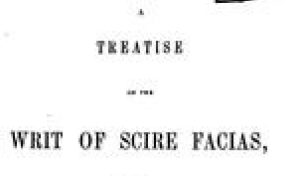 The writ of “scire facias” made one of its rare appearances in City of Dallas v. Ellis, after ten years passed from rendition of judgment, and the two-year grace period for a writ of scire facias expired as well. Unfortunately for the judgment debtor, under another provision of the Civil Practice & Remedies Code, the grace period does not expire for a judgment held by an incorporated city. The debtor did not persuade the Fifth Court that the city’s case should be viewed as one for subrogation that could potentially avoid that provision. No. 05-16-00348-CV (Feb. 17, 2017) (mem. op.)
The writ of “scire facias” made one of its rare appearances in City of Dallas v. Ellis, after ten years passed from rendition of judgment, and the two-year grace period for a writ of scire facias expired as well. Unfortunately for the judgment debtor, under another provision of the Civil Practice & Remedies Code, the grace period does not expire for a judgment held by an incorporated city. The debtor did not persuade the Fifth Court that the city’s case should be viewed as one for subrogation that could potentially avoid that provision. No. 05-16-00348-CV (Feb. 17, 2017) (mem. op.)
In Baxter & Associates, LLC v. D&D Elevators, Inc., No. 05-16-003300-CV (Feb. 15, 2017), the plaintiff appealed from the denial of a temporary injunction against former employees and the company they formed. The plaintiff alleged that the former employees took trade secrets, namely a list of builders with projects potentially including elevators, in violation of their fiduciary duties and the Texas Uniform Trade Secrets Act (“TUTSA”).
After a two-day hearing, the parties received a signed order denying the request for temporary injunction, which was attached to an email from the court administrator stating, “The Court makes the following rulings: … I do find that trade secret as to existing jobs or bids was obtained… [but] there is an adequate remedy at law….” The plaintiff requested findings of fact and conclusions of law, and filed a motion for reconsideration based on its argument that it did not need to show no adequate remedy at law under TUTSA to obtain injunctive relief. The trial court did not sign any findings of fact or conclusions of law, and the plaintiff appealed without filing a notice of past due findings and conclusions of law.
The first issue addressed by the court was procedural—whether the statement contained in the court administrator’s email stating the existence of trade secrets was a finding of fact. The Court of Appeals held it was not, in part because at a subsequent hearing the trial court stated that it had not made such a finding. Although the plaintiff formally requested findings of fact and conclusions of law, it failed to file a notice of past due findings and conclusions of law pursuant to Rule 297. Thus, the Court of Appeals held there were no findings of fact or conclusions of law, that any error for the failure to make such findings was not preserved, and implied a finding that the plaintiff had not shown the existence of a trade secret.
The Court went on to hold that there was evidence that would have allowed the trial court to conclude that the list of projects was not a trade secret because the information could be publicly identified, and therefore would not “derive[] independent economic value, actual or potential, from not being generally known….”
Baxter & Associates, LLC v. D&D Elevators, Inc., No. 05-16-003300-CV (Feb. 15, 2017)
 vRide, a vanpool service, sought statutory indemnity from Ford after an accident, contending that the plaintiffs alleged – in substance – a products liability claim. The Fifth Court disagreed: The Cernoseks’ petition did not allege that the Ford van was unreasonably dangerous, was defective by manufacture or design, was rendered defective because it lacked certain safety features, or was otherwise defective. Instead, the petition alleged that vRide represented its vehicles had certain safety features when in actuality the vehicles did not have those safety features and that vRide failed to furnish vehicles with those safety features. In short, the Cernoseks’ petition did not contain allegations that the damages arose out of personal injury, death, or property damage allegedly caused by a defective product.” vRide v. Ford, No. 05-15-01377-CV (Feb. 2, 2017) (mem. op.)
vRide, a vanpool service, sought statutory indemnity from Ford after an accident, contending that the plaintiffs alleged – in substance – a products liability claim. The Fifth Court disagreed: The Cernoseks’ petition did not allege that the Ford van was unreasonably dangerous, was defective by manufacture or design, was rendered defective because it lacked certain safety features, or was otherwise defective. Instead, the petition alleged that vRide represented its vehicles had certain safety features when in actuality the vehicles did not have those safety features and that vRide failed to furnish vehicles with those safety features. In short, the Cernoseks’ petition did not contain allegations that the damages arose out of personal injury, death, or property damage allegedly caused by a defective product.” vRide v. Ford, No. 05-15-01377-CV (Feb. 2, 2017) (mem. op.)
 The dispute that rolled into court in Wheel Technologies v. Gonzalez was whether a shipment of wheels had been delivered. The companies’ records were important but not dispositive, as the Fifth Court rounded up the facts: “This case essentially came down to a ‘he said, he said’ between two parties’ explanations of accounting. Blaser testified WTI always created a purchase order when it received a delivery and because WTI had no record of any outstanding purchase orders owed to Gonzalez, then it never received the tires. Gonzalez testified to the contrary. . . . Further, Blaser admitted he could not say for sure Owens always created a purchase order upon receipt of tires because Blaser was never personally involved in any of the transactions. Rather, Gonzalez testified there were many times in which the deliveries occurred after hours so checks and other documentation were not always ready when he made a delivery.” No. 05-16-00068-CV (Feb. 8, 2017) (mem. op.)
The dispute that rolled into court in Wheel Technologies v. Gonzalez was whether a shipment of wheels had been delivered. The companies’ records were important but not dispositive, as the Fifth Court rounded up the facts: “This case essentially came down to a ‘he said, he said’ between two parties’ explanations of accounting. Blaser testified WTI always created a purchase order when it received a delivery and because WTI had no record of any outstanding purchase orders owed to Gonzalez, then it never received the tires. Gonzalez testified to the contrary. . . . Further, Blaser admitted he could not say for sure Owens always created a purchase order upon receipt of tires because Blaser was never personally involved in any of the transactions. Rather, Gonzalez testified there were many times in which the deliveries occurred after hours so checks and other documentation were not always ready when he made a delivery.” No. 05-16-00068-CV (Feb. 8, 2017) (mem. op.)
In In re FPWP GP LLC, et al. (January 25, 2017), the Dallas Court of Appeals conditionally granted a writ of mandamus for the district court’s failure to transfer venue under the mandatory venue provision of Section 65.023 of the Civil Practice & Remedies Code, which provides that “a writ of injunction against a party who is a resident of this state shall be tried in … the county in which the party is domiciled.” Courts have struggled at times to apply Section 65.023 because it does not apply to all suits seeking an injunction, but instead only to suits in which the relief requested is “purely or primarily injunctive.” So, if the primary form of relief is something else, e.g. damages, then the mandatory venue provision does not apply. The opinion gave examples of the exception, such as when injunctive relief is simply to maintain the status quo pending litigation or when there is no request for a permanent injunction. But in the case at hand, the plaintiff sought only a declaratory judgment that was effectively a mirror image of the permanent injunctive relief requested. Holding the injunction “was a means to the same end” as the declaratory judgment, the Court held that the primary purpose of the lawsuit was injunctive and that transfer to the county of domicile of the defendants was mandatory under Section 65.023.
When is a fraud claim subject to a 2-year limitations period? When it’s not a fraud claim.
January 25, 2017In Parsons v. Queenan, et al., No. 05-15-01375-CV (January 23, 2017), the Dallas Court of Appeals affirmed summary judgment in favor of the defendants on limitations grounds. The suit was Parsons’ third in a series of malpractice suits against different attorneys that represented him since the death of his wife in a plane crash more than two decades earlier.
The first issue was whether the breach of fiduciary duty and fraud claims were subject to a 2-year statute of limitations for negligence or a 4-year statute of limitations for fraud or breach of fiduciary duty. The Dallas Court held that the 2-year limitations period applied under the anti-fracturing rule, which prevents legal malpractice plaintiffs from “opportunistically transforming a claim that sounds only in negligence into other claims” to avail themselves of longer limitations periods, less onerous proof requirements, or other tactical advantages. For the anti-fracturing rule to apply, the gravamen of the complaint must focus on the quality or adequacy of the attorney’s representation. The Dallas Court concluded that the fraud and breach of fiduciary duty claims asserted by Parsons were claims for professional negligence as a matter of law.
In the second issue, the Dallas Court held that the 2-year limitations period began to run on the date of the denial of the motion for reconsideration by the Texas Supreme Court in the underlying litigation, not the date mandate was issued. Under Hughes v. Mahaney & Higgins, 821 S.W.2d 154 (Tex. 1991), “the statute of limitations on the malpractice claim against the attorney is tolled until all appeals on the underlying claim are exhausted.” Id. at 157. The Dallas Court held that appeals are exhausted when a motion for rehearing with the Texas Supreme Court is denied because that is the last action of right that can be taken in the underlying case.
Parsons v. Queenan, et al., No. 05-15-01375-CV (January 23, 2017)
 Appeals from forcible entry and detainer actions are common and we do not ordinarily report on them, but it has been some time since we last noted a summary of key principles. A good one appears in the recent case of McCall v. Fannie Mae, in which the appellant alleged improprieties about the relevant foreclosure sale. “But,” noted the Fifth Court, “the deed of trust expressly created a landlord and tenant-at-sufferance relationship when the property was sold by foreclosure. This provided an independent basis to determine the issue of immediate possession without resolving the issue of title. As we have explained, any defects in the foreclosure process . . . may be pursued in a suit for wrongful foreclosure or to set aside the substitute trustee’s deed, but they are not relevant in this forcible detainer action.” No. 05-16-00010-CV (Jan. 20, 2017) (mem. op.)
Appeals from forcible entry and detainer actions are common and we do not ordinarily report on them, but it has been some time since we last noted a summary of key principles. A good one appears in the recent case of McCall v. Fannie Mae, in which the appellant alleged improprieties about the relevant foreclosure sale. “But,” noted the Fifth Court, “the deed of trust expressly created a landlord and tenant-at-sufferance relationship when the property was sold by foreclosure. This provided an independent basis to determine the issue of immediate possession without resolving the issue of title. As we have explained, any defects in the foreclosure process . . . may be pursued in a suit for wrongful foreclosure or to set aside the substitute trustee’s deed, but they are not relevant in this forcible detainer action.” No. 05-16-00010-CV (Jan. 20, 2017) (mem. op.)
Claims to stop payment to Paxton prosecutors moot and still not ripe—no jurisdiction.
January 19, 2017The Dallas Court of Appeals was pulled into one of the wide-ranging disputes concerning the prosecution of Texas Attorney General Ken Paxton, this one concerning the payment of private attorneys appointed to prosecute Paxton. The Dallas Court determined that it lacked jurisdiction because the claims were moot and were not yet ripe.
Attorneys were appointed to prosecute Paxton after the Collin County Criminal District Attorney recused his office. The appointed attorneys were to be paid $300 per hour, which was more than fixed $1000 for most court appointed attorneys for indigent defendants under the Collin County local rules, which also apply to appointed prosecutors. However, the local rules also provided “Payment can vary from the fee schedule in unusual circumstances or where the fee would be manifestly inappropriate because of circumstances beyond the control of the appointed counsel.”
On December 11, 2015, the appointed prosecutors sought an interim payment of $254,908.85 from Collin County. Three weeks later, Collin County taxpayer Jeffory Blackard sued seeking a temporary restraining order and injunction preventing payment, asserting that as a taxpayer he had standing to seek to enforce the local rules fixing most fees at a flat $1000. The Collin County judge recused himself, and the taxpayer suit was assigned to County Court at Law No. 5 in Dallas County.
A week after Blackard filed his taxpayer suit, the presiding judge over the criminal prosecution, a Tarrant County judge, approved the payment of the request for interim fees and ordered that the fees be presented to the Collin County Commissioner’s Court for payment. The next day, Blackard filed a supplemental application for temporary restraining order in the Dallas County taxpayer suit, which was denied one day later. Three days after that, only one month after the initial request for interim fees was made, the Collin County Commissioners Court voted to pay. Blackard then filed an amended petition seeking injunctive relief preventing any future requests for attorney’s fees by the appointed prosecutors. The County Court at Law determined that it lacked jurisdiction and granted the defendants’ pleas to the jurisdiction. Blackard appealed.
The Dallas Court began its analysis by noting that mootness and ripeness are threshold issues that implicate subject matter jurisdiction. Rendering opinions under either circumstance violates the prohibition against rendering advisory opinions because such cases present no justiciable controversy.
The Dallas Court held that Blackard’s claims relating to the interim fees were moot because the fees had already been paid and, under Texas law, taxpayers have standing only to seek to enjoin future payments, not to recover funds that have already been paid. Blackard asserted on appeal that his claims fell within the exception to mootness for claims “capable of repetition, yet evading review” because the appointed attorneys stipulated that they anticipated submitting future invoices. But the Dallas Court rejected that exception, which “applies only in rare circumstances.” It noted that the exception had previously only been used to challenge unconstitutional acts performed by the government, and held that the process by which fees would be requested in the future provided sufficient time for Blackard to seek judicial review prior to payment, pointing to the month between the initial request for interim fees and payment.
In addition, the Dallas Court held that claims relating to future invoices were not yet ripe. While it was stipulated that additional fees would be requested, it was not stipulated that the additional requests would be for $300 an hour or otherwise would be inconsistent with the Collin County fee schedule. So the Dallas Court concluded there was no live controversy concerning future requests for fees.
In the common fact situation of an employee leaving for a new, competing employer, the Fifth Court found no abuse of discretion in denying a temporary injunction when:
- After his termination, Turner did not have access to any confidential information except for the contents of a laptop
- Turner testified that he did not access the laptop following his termination except to examine his girlfriend’s resume and his employment agreement and when he took it to the Apple Store to have his personal photographs removed from the computer.
- Plaintiff had a forensic examination of the computer performed, and it presented no evidence that Turner’s testimony was false.
- When Turner also testified that when he went to work for Gulfstream, he did not contact any of BM Medical’s clients with whom he had worked while employed by BM Medical (although some contacted him to find out what had happened to him); and
- Only one client of BM Medical became a client of Gulfstream, who was a good friend of Turner’s whom Turner had known before he went to work for BM Medical, and who still did business with BM Medical.
BM Medical Management Service LLC v. Turner, No. 05-16-00670-CV (Jan. 10, 2017) (mem. op.)
 The first ever Bench-Bar conference for the Northern District of Texas will be held on January 27 at the Four Seasons in Las Colinas. Here is the schedule and registration information; it looks to be a great program and the beginning of a strong tradition.
The first ever Bench-Bar conference for the Northern District of Texas will be held on January 27 at the Four Seasons in Las Colinas. Here is the schedule and registration information; it looks to be a great program and the beginning of a strong tradition.
 Governor Abbott has appointed Dallas attorney Jason Boatright to the vacancy on the Fifth Court; more information is available in the official press release.
Governor Abbott has appointed Dallas attorney Jason Boatright to the vacancy on the Fifth Court; more information is available in the official press release.
Enxeco Inc. v. Staley reversed a dismissal for want of prosecution, observing: “[T]he rules of judicial administration provide that civil non-jury cases should be brought to trial or final disposition within twelve months from the defendant’s appearance date. The administrative rules expressly recognize, however, that in complex cases or special circumstances ‘it may not be possible to adhere to these standards.'” (citations omitted). Here, such circumstances were presented by lengthy motion practice about forum and capacity issues. The Court gave little weight to plaintiff’s decision to not pursue discovery, noting that no rule compelled it to do so. No. 05-15-01047-CV (Jan. 9, 2017) (mem. op.)
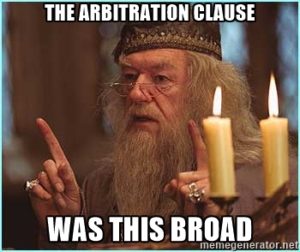 Heath’s employment agreement incorporated a confidentiality agreement, which in turn required arbitration of “any controversy, dispute or claim arising out of or in any way related to or involving the interpretation, performance or breach of this Agreement . . .” The Fifth Court noted that phrases such as “any controversy” are viewed, by federal and state courts, as “broad arbitration clauses capable of expansive reach.” It rejected the argument that the term “this Agreement” referred only to the confidentiality agreement, even though that agreement had a merger clause, because the arbitration clause refers to both claims “arising out of” and “in any way related to” the agreement. The Court also noted that the employment and confidentiality agreement were executed at the same time, and that its holding would apply fully to Heath’s tort claims as well. Advocare GP LLC v. Heath, No. 05-16-0049-CV (Jan. 5, 2017) (mem. op.)
Heath’s employment agreement incorporated a confidentiality agreement, which in turn required arbitration of “any controversy, dispute or claim arising out of or in any way related to or involving the interpretation, performance or breach of this Agreement . . .” The Fifth Court noted that phrases such as “any controversy” are viewed, by federal and state courts, as “broad arbitration clauses capable of expansive reach.” It rejected the argument that the term “this Agreement” referred only to the confidentiality agreement, even though that agreement had a merger clause, because the arbitration clause refers to both claims “arising out of” and “in any way related to” the agreement. The Court also noted that the employment and confidentiality agreement were executed at the same time, and that its holding would apply fully to Heath’s tort claims as well. Advocare GP LLC v. Heath, No. 05-16-0049-CV (Jan. 5, 2017) (mem. op.)
The trial court granted summary judgment for the employer (oddly enough, a labor union) in a dispute arising from an employee’s benefits. The Fifth Court reversed, finding ambiguity in the underlying disability policy (noting, in particular, its interplay with separately-drafted legal instruments about the employment relationship – a recurring issue in disputes about arbitration clauses), and also finding related fact issues about whether the contract was unilateral or bilateral, and whether the employee had exhausted administrative remedies. The opinion recaps the major authorities about the role of contractual ambiguity in a summary judgment analysis. Videtich v. Transport Workers Union of Am., No. 05-15-01449-CV (Dec. 29, 2016) (mem. op.)
 Nations Renovations successfullly sued Hong in quantum meruit for unpaid construction work, and successfully defended against misrepresentation claims. The Fifth Court affirmed based on contract terms. As to the quantum meruit claim, it noted: “Because the four items [at issue] are listed only as recommendations and the other items of Extra Work claimed by Nations are not mentioned in the Contract, we conclude the Extra Work is not covered by the Contract. Therefore, the trial court properly submitted the quantum meruit question to the jury.” As to the misrepresentation claims, applying Italian Cowboy, the Court found this disclaimer of reliance to be effective: “17. ANY REPRESENTATIONS, STATEMENTS, OR OTHER COMMUNICATIONS NOT WRITTEN ON THIS CONTRACT ARE AGREED TO BE IMMATERIAL and not relied on by either party and do not survive the execution of this contract.” Hong v. Nations Renovations LLC, No. 05-15-01036-CV (Dec. 29, 2016) (mem. op.)
Nations Renovations successfullly sued Hong in quantum meruit for unpaid construction work, and successfully defended against misrepresentation claims. The Fifth Court affirmed based on contract terms. As to the quantum meruit claim, it noted: “Because the four items [at issue] are listed only as recommendations and the other items of Extra Work claimed by Nations are not mentioned in the Contract, we conclude the Extra Work is not covered by the Contract. Therefore, the trial court properly submitted the quantum meruit question to the jury.” As to the misrepresentation claims, applying Italian Cowboy, the Court found this disclaimer of reliance to be effective: “17. ANY REPRESENTATIONS, STATEMENTS, OR OTHER COMMUNICATIONS NOT WRITTEN ON THIS CONTRACT ARE AGREED TO BE IMMATERIAL and not relied on by either party and do not survive the execution of this contract.” Hong v. Nations Renovations LLC, No. 05-15-01036-CV (Dec. 29, 2016) (mem. op.)
 In Heritage Numismatic Auctions v. Stiel, a dispute about the the sale of rare coins, the Fifth Court affirmed the denial of a motion to compel arbitration, finding that the relevant documents were not adequately proved up by the sponsoring affidavit. The witness “did not testify that the documents in Exhibit F were ‘true and correct’ copies of the contracts or otherwise state that they were the originals or exact duplicates of the originals.” While the affidavit began with the phrase, “The facts contained herein are true and correct,” the Court held that “[t]he trial court could interpret this statement as asserting the factual averments in the affidavit were true and correct but not asserting the documents in Exhibit F were the originals or exact duplicates of the originals as required by Rule 902(10)(B)(2).” Finally, from a general description of the documents as “the various Terms and Conditions . . . ,” the Court held that “[t]he trial court could have concluded that [the witness’s] statement did not constitute testimony that the documents in Exhibit F were the originals or exact copies of the contracts.” No. 05-16-00299-CV (Dec. 16, 2016) (mem. op.)
In Heritage Numismatic Auctions v. Stiel, a dispute about the the sale of rare coins, the Fifth Court affirmed the denial of a motion to compel arbitration, finding that the relevant documents were not adequately proved up by the sponsoring affidavit. The witness “did not testify that the documents in Exhibit F were ‘true and correct’ copies of the contracts or otherwise state that they were the originals or exact duplicates of the originals.” While the affidavit began with the phrase, “The facts contained herein are true and correct,” the Court held that “[t]he trial court could interpret this statement as asserting the factual averments in the affidavit were true and correct but not asserting the documents in Exhibit F were the originals or exact duplicates of the originals as required by Rule 902(10)(B)(2).” Finally, from a general description of the documents as “the various Terms and Conditions . . . ,” the Court held that “[t]he trial court could have concluded that [the witness’s] statement did not constitute testimony that the documents in Exhibit F were the originals or exact copies of the contracts.” No. 05-16-00299-CV (Dec. 16, 2016) (mem. op.)
 In a technical but financially critical decision, Eddington v. Dallas Police & Fire Pension System, the Fifth Court held that adjustments to the future interest rate paid on accounts established under a pension plan, sponsored by the beleaguered Dallas Police & Fire Pension system, did not violate the prohibition on benefit reductions contained in article XVI, section 66 of the Texas Constitution. No. 05-15-00839-CV (Dec. 13, 2016). Of general interest, a component of its analysis reviewed when a federal Fifth Circuit opinion about state law matters will be followed in state court.
In a technical but financially critical decision, Eddington v. Dallas Police & Fire Pension System, the Fifth Court held that adjustments to the future interest rate paid on accounts established under a pension plan, sponsored by the beleaguered Dallas Police & Fire Pension system, did not violate the prohibition on benefit reductions contained in article XVI, section 66 of the Texas Constitution. No. 05-15-00839-CV (Dec. 13, 2016). Of general interest, a component of its analysis reviewed when a federal Fifth Circuit opinion about state law matters will be followed in state court.
 Yes, it arose in the unusu
Yes, it arose in the unusu al procedural posture of a Rule 736 home equity loan foreclosure, and no, it is not the recommended practice. That said, the relators in the case of In re:
al procedural posture of a Rule 736 home equity loan foreclosure, and no, it is not the recommended practice. That said, the relators in the case of In re:  Priester successfully convinced the Fifth Court to reverse direction and, on rehearing, grant a writ of mandamus in their favor “[i]n light of the more developed record and clarified arguments . . . .” No. 05-16-00965-CV (Nov. 21, 2016) (mem. op.)
Priester successfully convinced the Fifth Court to reverse direction and, on rehearing, grant a writ of mandamus in their favor “[i]n light of the more developed record and clarified arguments . . . .” No. 05-16-00965-CV (Nov. 21, 2016) (mem. op.)
 While affirming a relatively straightforward judgment in a home loan dispute, the Fifth Court observed: “The unjust enrichment doctrine applies principles of restitution to disputes where there is no actual contract and is based on the equitable principle that one who receives benefits which would be unjust for him to retain ought to make restitution.” Ihde v. First Horizon Home Loans, No. 05-15-01084-CV (Nov. 28, 2016) (mem. op.) (emphasis added) A counterpoint in this practical but rarely-visited area of remedies law appears in City of Harker Heights v. Sun Meadows Land Ltd., 830 S.W.2d 313, 317 (Tex. App.–Austin 1992, no writ), which observes: “An action for money had and received may be founded upon an express agreement or one implied in fact, but it is not dependent upon either.” (emphasis added).
While affirming a relatively straightforward judgment in a home loan dispute, the Fifth Court observed: “The unjust enrichment doctrine applies principles of restitution to disputes where there is no actual contract and is based on the equitable principle that one who receives benefits which would be unjust for him to retain ought to make restitution.” Ihde v. First Horizon Home Loans, No. 05-15-01084-CV (Nov. 28, 2016) (mem. op.) (emphasis added) A counterpoint in this practical but rarely-visited area of remedies law appears in City of Harker Heights v. Sun Meadows Land Ltd., 830 S.W.2d 313, 317 (Tex. App.–Austin 1992, no writ), which observes: “An action for money had and received may be founded upon an express agreement or one implied in fact, but it is not dependent upon either.” (emphasis added).
 I was on the trial team that won a $146 million verdict in Pecos, Texas last week; here is the Dallas Morning News’s recent story on the case.
I was on the trial team that won a $146 million verdict in Pecos, Texas last week; here is the Dallas Morning News’s recent story on the case.
 Plaintiffs won a lawsuit against their landlord about the handling of their security deposit. The Fifth Court affirmed, reversing only as to prejudgment interest. While the parties’ lease said that “[a]ny person who is a prevailing party in any legal proceeding brought under or related to the transaction described in this lease is entitled to recover prejudgment interest,” the plaintiffs recovered based on section 92.109(a) of the Property Code, which allows recovery of statutory penalties in the event of a landlord’s bad faith retention of the security deposit. Because “[p]rejudgment interest does not apply to statutory penalties imposed for wrongdoing,” and the underlying statute did not provide for recovery of prejudgment interest, the interest award could not stand. Frazin v. Sauty, No. 05-15-00879-CV (Nov. 6, 2016) (mem. op.)
Plaintiffs won a lawsuit against their landlord about the handling of their security deposit. The Fifth Court affirmed, reversing only as to prejudgment interest. While the parties’ lease said that “[a]ny person who is a prevailing party in any legal proceeding brought under or related to the transaction described in this lease is entitled to recover prejudgment interest,” the plaintiffs recovered based on section 92.109(a) of the Property Code, which allows recovery of statutory penalties in the event of a landlord’s bad faith retention of the security deposit. Because “[p]rejudgment interest does not apply to statutory penalties imposed for wrongdoing,” and the underlying statute did not provide for recovery of prejudgment interest, the interest award could not stand. Frazin v. Sauty, No. 05-15-00879-CV (Nov. 6, 2016) (mem. op.)
The first rule of confidential settlements is: we don’t talk about confidential settlements
November 4, 2016GDL Masonry Supply, Inc. v Lopez and Rapid Masonry Supply, Inc. (November 2, 2016) is a handy opinion to hand your clients after they sign a settlement agreement requiring confidentiality. It is a risk too many clients do not take seriously enough (see, e.g., “Girl costs father $80,000 with ‘SUCK IT’ Facebook post“).
In GDL, the Dallas Court of Appeals affirmed summary judgment in favor of Rapid, the plaintiff, who refused to pay under a settlement agreement because GDL failed to satisfy the confidentiality requirements of the agreement. The facts were too common. GDL brought suit against Rapid, which settled by way of an agreement that required confidentiality and Rapid to make a series of $10,000 payments totaling $60,000 to GDL. GDL then told a third party that Rapid had stolen from it, that GDL won the lawsuit, and that Rapid owed GDL money as a result. When Rapid discovered what GDL said about their litigation, it sued asserting that it had no obligation to make the remaining settlement payments and also seeking attorney’s fees for breach of the confidentiality language. The trial court granted summary judgment to Rapid, holding that the confidentiality provision was breached, that Rapid had no obligation to make further payments, and awarding attorney’s fees.
GDL’s argument on appeal did not deny the disclosure of the settlement, but instead challenged the materiality of the confidentiality provision. The Dallas Court of Appeals made swift work in rejecting this argument, noting that the settlement agreement itself stated that the confidentiality paragraph “is a material provision of this Agreement and that any breach of the terms and conditions of [the paragraph] shall be a material breach of this Agreement.” The Court held that the contract’s language was binding.
GDL Masonry Supply, Inc. v Lopez and Rapid Masonry Supply, Inc.
From sister blog 600Camp – celebrate Halloween with these Five Recent Fifth Circuit Cases to Know. And don’t forget to vote for Super Lawyers by this Friday, October 28!
 A classic example of a “too soon” appeal appears in Bolden v. Fidelity Nat’l Title: “In the original petition, appellee sought both damages for breach of warranty of title and attorney’s fees. The trial court signed a default judgment awarding damages for
A classic example of a “too soon” appeal appears in Bolden v. Fidelity Nat’l Title: “In the original petition, appellee sought both damages for breach of warranty of title and attorney’s fees. The trial court signed a default judgment awarding damages for  breach of warranty of title. The default judgment is silent as to appellee’s claim for attorney’s fees. Because the claim for attorney’s fees remains pending, the judgment is not final.” No. 05-16-00398-CV (Oct. 14, 2016) (mem. op.)
breach of warranty of title. The default judgment is silent as to appellee’s claim for attorney’s fees. Because the claim for attorney’s fees remains pending, the judgment is not final.” No. 05-16-00398-CV (Oct. 14, 2016) (mem. op.)
 The relator in the case of In re: Schindler Elevator complained that the trial court “refused to issue findings of fact and conclusions of law explaining the court’s reasoning for denying relator’s motion for leave to designate responsible third parties.” The Fifth Court found no abuse of discretion, noting that the RTP proceeding was not a “trial” within the meaning of the applicable rule, and that the relator had a remedy by direct appeal. No. 05-16-01172-CV (Oct. 10, 2016) (mem. op.)
The relator in the case of In re: Schindler Elevator complained that the trial court “refused to issue findings of fact and conclusions of law explaining the court’s reasoning for denying relator’s motion for leave to designate responsible third parties.” The Fifth Court found no abuse of discretion, noting that the RTP proceeding was not a “trial” within the meaning of the applicable rule, and that the relator had a remedy by direct appeal. No. 05-16-01172-CV (Oct. 10, 2016) (mem. op.)
 If ever a case illustrated a trap for the unwary, it is IDA Engineering v. PBK Architects, in which the plaintiff sued exactly four years after the termination of its contractual relationship. Unfortunately, the invoices upon which its damage claim relied were issued before the contract termination, and the contracts contained this language about payment: “Invoices will be issued monthly, per
If ever a case illustrated a trap for the unwary, it is IDA Engineering v. PBK Architects, in which the plaintiff sued exactly four years after the termination of its contractual relationship. Unfortunately, the invoices upon which its damage claim relied were issued before the contract termination, and the contracts contained this language about payment: “Invoices will be issued monthly, per  percentage of completion or per phase and will be due upon issuance date.” (emphasis added). Accordingly, the claim was barred by limitations. No. 05-15-01418-CV (Oct. 4, 2016) (mem. op.)
percentage of completion or per phase and will be due upon issuance date.” (emphasis added). Accordingly, the claim was barred by limitations. No. 05-15-01418-CV (Oct. 4, 2016) (mem. op.)
 Axiomatic, but like many other basic mandamus concepts, worth remembering:
Axiomatic, but like many other basic mandamus concepts, worth remembering:
- If the trial court does not have jurisdiction to rule on relator’s motion, the motion cannot be categorized as “properly filed” for purposes of a potential writ of mandamus to compel a ruling;
- And if the the trial court does not have jurisdiction to rule on the motion, “it logically follows that it does not have a ministerial duty to rule on the motion.”
In re: Guzman, No. 05-16-01109-CV (Sept. 29, 2016) (mem. op.)
In In re: Douglas D. Halofitis, No. 05-16-01047-CV (Sept. 27, 2016) (mem. op.), the Fifth Court gives a helpful roadmap for parties who seek to challenge a judgment of which they were given late notice. We know that trial courts usually lose plenary jurisdiction over a judgment within 30 days after the court signs the judgment, which is also the deadline for filing an appeal. But what if you don’t receive notice of the judgment?
Under Rule 306a, when a party does not receive notice or acquire actual knowledge of judgment within twenty days, the deadlines begin to run not from the signing of the judgment, but instead from the sooner of the date the party received notice or acquired actual knowledge of the judgment or 90 days after the judgment was signed. A few pointers to keep in mind:
- the 306a motion must be sworn and must establish the date of first notice or knowledge of the judgment and that this date was more than 20 days after the judgment was signed;
- the 306a motion, including any evidentiary supplements necessary to satisfy the procedural requirements of 306a(5), must be filed within the court’s plenary period as calculated from the date of first notice or knowledge of the judgment;
- the movant should seek an immediate evidentiary hearing on the 306a motion and obtain a finding of fact of the date of first notice or actual knowledge of the judgment;
- in no event will the periods begin to run more than 90 days after the judgment is signed, meaning that if you receive notice more than 90 days after the judgment is signed, your only avenue may be a restricted appeal or bill of review; and
- the 306a motion should be coupled with a post-judgment motion, e.g. motion for new trial, motion to reinstate, or motion to modify judgment. If you wait for a decision on your 306a motion, your post-judgment motion may end up being untimely even if your Rule 306a motion is successful because post-judgment motions must still be filed within 30 days of the date found to be the date of first notice or actual knowledge of the judgment.
 A basic point, but one that bears frequent repetition, and the Court of Criminal Appeals concurrence ultimately cited by the Fifth Court is a quick and worthwhile read.: “As the party seeking relief, the relator has the burden of providing the Court with a sufficient record to establish his right to mandamus relief.” In re: Johnson, No. 05-16-01094-CV (Sept. 27, 2016) (mem. op.) (citing In re: Jones, No. 05-16- 00230-CV, 2016 WL 836835 (Tex. App.—Dallas March 4, 2016, orig. proceeding) (mem. op.) (citing Lizcano v. Chatham, 416 S.W.3d 862, 863 (Tex. Crim. App. 2011) (orig. proceeding) (Alcala, J. concurring))).
A basic point, but one that bears frequent repetition, and the Court of Criminal Appeals concurrence ultimately cited by the Fifth Court is a quick and worthwhile read.: “As the party seeking relief, the relator has the burden of providing the Court with a sufficient record to establish his right to mandamus relief.” In re: Johnson, No. 05-16-01094-CV (Sept. 27, 2016) (mem. op.) (citing In re: Jones, No. 05-16- 00230-CV, 2016 WL 836835 (Tex. App.—Dallas March 4, 2016, orig. proceeding) (mem. op.) (citing Lizcano v. Chatham, 416 S.W.3d 862, 863 (Tex. Crim. App. 2011) (orig. proceeding) (Alcala, J. concurring))).
 In its order denying a mandamus petition in the case of In re: Adelphi Group, the Fifth Court reminds: “Although parties may expend time and money if they are ordered to arbitration improperly, delay and expense—standing alone—will not render the final appeal inadequate. Further, mandamus as a remedy for review of orders compelling arbitration should be limited to the comparatively rare cases where the legislature has through statute expressed a public policy that overrides the public policy favoring arbitration.” No. 05-16-01060-CV (Sept. 22, 2016) (mem. op.)
In its order denying a mandamus petition in the case of In re: Adelphi Group, the Fifth Court reminds: “Although parties may expend time and money if they are ordered to arbitration improperly, delay and expense—standing alone—will not render the final appeal inadequate. Further, mandamus as a remedy for review of orders compelling arbitration should be limited to the comparatively rare cases where the legislature has through statute expressed a public policy that overrides the public policy favoring arbitration.” No. 05-16-01060-CV (Sept. 22, 2016) (mem. op.)
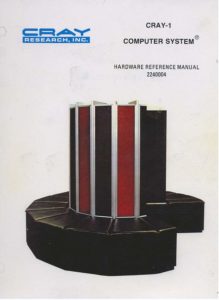 The Fifth Court is the first appellate court in Texas to offer an extension of TAMES that allows attorneys to see non-public documents; here is the official announcement.
The Fifth Court is the first appellate court in Texas to offer an extension of TAMES that allows attorneys to see non-public documents; here is the official announcement.
 Beasley v. Richardson, while involving facts unique to pro se litigation, provides a valuable reminder about preservation with relation to the handling of a nonsuit: “Error in dismissing a case with prejudice cannot be raised for the first time on appeal and must be presented to the trial court. To preserve a complaint of error in a judgment for appellate review, Beasley was required to inform the trial court of his objection by a post-judgment motion to amend or correct the judgment or a motion for new trial.” (citations omitted). No. 05-15-01156-CV (Sept. 20, 2016) (mem. op.)
Beasley v. Richardson, while involving facts unique to pro se litigation, provides a valuable reminder about preservation with relation to the handling of a nonsuit: “Error in dismissing a case with prejudice cannot be raised for the first time on appeal and must be presented to the trial court. To preserve a complaint of error in a judgment for appellate review, Beasley was required to inform the trial court of his objection by a post-judgment motion to amend or correct the judgment or a motion for new trial.” (citations omitted). No. 05-15-01156-CV (Sept. 20, 2016) (mem. op.)
Happy fifth birthday to the sister blog, 600 Camp, which follows commercial litigation in the U.S. Court of Appeals for the Fifth Circuit.
 Henry S. Miller Commercial Co. lost a trial on a fraud claim but succeeded in a later malpractice claim against its trial counsel. The Fifth Court resolved two issues – (1) postjudgment assignment of malpractice claims as part of a reorganization was acceptable where “Here, HSM asserted its own malpractice claim against the Lawyers in its own name. It pursued its own claim through trial and judgment. Under these circumstances, HSM’s right ‘to bring [its] own cause of action for malpractice is not vitiated’ by the assignment to its judgment creditors” (applying Tate v. Goins, Underkofler, Crawford & Langdon, 24 S.W.3d 627, 629 (Tex. App.—Dallas 2000, pet. denied)); and (2) the trial court erred in dismissing HSM’s claim for gross negligence based on the failure to designate a key responsible third party. Accordingly, because a new trial was required on punitive damages, it was also required on compensatory damages, and thus liability as well. Henry S. Miller Comm’l Co. v. Newsom, Terry & Newsom LLP, No. 05-14-01188-CV (Sept. 14, 2016) (mem. op.)
Henry S. Miller Commercial Co. lost a trial on a fraud claim but succeeded in a later malpractice claim against its trial counsel. The Fifth Court resolved two issues – (1) postjudgment assignment of malpractice claims as part of a reorganization was acceptable where “Here, HSM asserted its own malpractice claim against the Lawyers in its own name. It pursued its own claim through trial and judgment. Under these circumstances, HSM’s right ‘to bring [its] own cause of action for malpractice is not vitiated’ by the assignment to its judgment creditors” (applying Tate v. Goins, Underkofler, Crawford & Langdon, 24 S.W.3d 627, 629 (Tex. App.—Dallas 2000, pet. denied)); and (2) the trial court erred in dismissing HSM’s claim for gross negligence based on the failure to designate a key responsible third party. Accordingly, because a new trial was required on punitive damages, it was also required on compensatory damages, and thus liability as well. Henry S. Miller Comm’l Co. v. Newsom, Terry & Newsom LLP, No. 05-14-01188-CV (Sept. 14, 2016) (mem. op.)
Here is my PowerPoint from my “Fifth Circuit Update” presentation at the Advanced Civil Appellate Course in Austin. Note that it includes some initial notes on Globeranger-AG v. Software AG, a major intellectual property opinion released by the U.S. Fifth Circuit earlier this week.
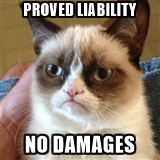 “Legal-malpractice damages are the difference between the result obtained from the client and the result that would have been obtained with competent counsel. Here, the result obtained, foreclosure, was inevitable concerning [Plaintiff’s] failure to pay her mortgage in her past and her refusal to pay in order to bring the loan current. Under these circumstances . . . there is no evidence of damages resulting from any alleged legal malpractice.” Sheetz v. Slaughter, No. 05-14-00982-CV (Aug. 31, 2016) (mem. op.)
“Legal-malpractice damages are the difference between the result obtained from the client and the result that would have been obtained with competent counsel. Here, the result obtained, foreclosure, was inevitable concerning [Plaintiff’s] failure to pay her mortgage in her past and her refusal to pay in order to bring the loan current. Under these circumstances . . . there is no evidence of damages resulting from any alleged legal malpractice.” Sheetz v. Slaughter, No. 05-14-00982-CV (Aug. 31, 2016) (mem. op.)
The Fifth Court has now joined the line of cases stating that CPRC § 38.001 only allows an award of attorneys fees against certain kinds of business entities (although bypassing the actual application of that statement on the specific, conflicting facts presented about the defendants’ business structure): “Under the plain language of section 38.001, a trial court cannot order limited liability partnerships (L.L.P.), limited liability companies (L.L.C.), or limited partnerships (L.P.) to pay attorneys’ fees.” Varel Int’l Indus., LP v. PetroDrillBits Int’l, Inc., No. 05-14-01556-CV (Aug. 30, 2016) (mem. op.)
 Ten Hagen Excavating, Inc. v. Castro-Lopez presents a detailed review of the evidence about a serious truck accident, involving issues of tort law beyond the usual scope of this blog. As a matter of style, the opinion is notable for deftly using accident photos in its description of and analysis of the issues, as well as a diagram of how the accident happened. No. 05-15-00902-CV (Aug. 29, 2016).
Ten Hagen Excavating, Inc. v. Castro-Lopez presents a detailed review of the evidence about a serious truck accident, involving issues of tort law beyond the usual scope of this blog. As a matter of style, the opinion is notable for deftly using accident photos in its description of and analysis of the issues, as well as a diagram of how the accident happened. No. 05-15-00902-CV (Aug. 29, 2016).
 Despite a contract between Texas Instruments and Volt, an employment agency, saying that Volt was an independent contractor, the Fifth Court reversed a jury verdict on the issue of whether Udell – a worker supplied by Volt – was an employee for p
Despite a contract between Texas Instruments and Volt, an employment agency, saying that Volt was an independent contractor, the Fifth Court reversed a jury verdict on the issue of whether Udell – a worker supplied by Volt – was an employee for p urposes of workers compensation. Reviewing the record in detail, the Court concluded that “Udell was working on TI’s premises, in furtherance of TI’s day-to-day business, and the detail
urposes of workers compensation. Reviewing the record in detail, the Court concluded that “Udell was working on TI’s premises, in furtherance of TI’s day-to-day business, and the detail
s of Udell’s work that gave rise to his injury were directed by TI.” Texas Instruments v. Udell, No. 05-14-01042-CV (Aug. 24, 2016) (mem. op.)
 In Cooper v. Campbell, the Fifth Court reviewed the key principles that govern “equitable remedies such as disgorgement and forfeiture to remedy a breach of fiduciary duty” —
In Cooper v. Campbell, the Fifth Court reviewed the key principles that govern “equitable remedies such as disgorgement and forfeiture to remedy a breach of fiduciary duty” —
- “The central purpose of forfeiture as an equitable remedy is not to compensate the injured principal, but to protect relationships of trust by discouraging disloyalty.
- “Disgorgement is compensatory in the same sense as attorney fees, interest, and costs, but it is not damages. . . . In fact, a claimant need not prove actual damages to succeed on a claim for forfeiture because they address different wrongs. In addition to serving as a deterrent, forfeiture can serve as restitution to a principal who did not receive the benefit of the bargain due to his agent’s breach of fiduciary duty. . . .”
- “The amount of disgorgement is based on the circumstances and is within the trial court’s discretion.”
The Court then remanded for more fulsome consideration of factors identifed in ERI Consulting Engineers v. Swinnea, 318 S.W.3d 867 (Tex. 2010). No. 05-15-00340-CV (Aug. 24, 2016) (mem. op.) On the general subject of disgorgement, other useful references from the Fifth Court are its recent opinion in Premier Pools Management Corp. v. Premier Pools Inc., and McCullough v. Scarbrough, Medlin & Associates, 435 S.W.3d 871, 904 (Tex. App.-Dallas 2014, pet. denied).
I n some detail, the district court ordered Altesse Healthcare not to deplete the assets of a business, whereupon: “Altesses’s actions in failing to comply with the TRO resulted in destroying the value of the company over which the lawsuit was based. In essence, Altesse took over running the company and then failed to make the scheduled payments when due, leaving the Wilsons without the company or payment. After the trial court ordered Altesse to return the company to the Wilsons, Altesse delayed and by the time it returned the necessary assets to run the business, there was little left to run.” The Fifth Court affirmed the trial court’s detailed order awarding “death penalty” sanctions and other penalties, including contempt. Altesse Healthcare Solutions v. Wilson, No. 05-15-00906-CV (Aug. 23, 2016) (mem. op.)
n some detail, the district court ordered Altesse Healthcare not to deplete the assets of a business, whereupon: “Altesses’s actions in failing to comply with the TRO resulted in destroying the value of the company over which the lawsuit was based. In essence, Altesse took over running the company and then failed to make the scheduled payments when due, leaving the Wilsons without the company or payment. After the trial court ordered Altesse to return the company to the Wilsons, Altesse delayed and by the time it returned the necessary assets to run the business, there was little left to run.” The Fifth Court affirmed the trial court’s detailed order awarding “death penalty” sanctions and other penalties, including contempt. Altesse Healthcare Solutions v. Wilson, No. 05-15-00906-CV (Aug. 23, 2016) (mem. op.)
 We all too easily forget that the requirements of a good appellate brief are defined by law, as recently noted in Lau v. Reeder, No. 05-14-01459-CV (Aug. 16, 2016) (mem. op.)
We all too easily forget that the requirements of a good appellate brief are defined by law, as recently noted in Lau v. Reeder, No. 05-14-01459-CV (Aug. 16, 2016) (mem. op.)
As to the issues presented, “a brief must state concisely all issues for review and reveal the legal questions we are called upon to decide. See TEX. R. APP. P. 38.1(f); Bolling v. Farmers Branch Indep. Sch. Dis., 315 S.W.3d 893, 896 (Tex. App.—Dallas 2010, no pet.).”
As to the record citations that accompany the argument, the Justices “have no right or obligation to search through the record to find facts or research relevant law that might support an appellant’s position because doing so –4– would ‘improperly transform this Court from neutral adjudicators to advocates.’ Chappell v. Allen, 414 S.W.3d 316, 321 (Tex. App.—El Paso 2013, no pet.)”
And as to good draftsmanship, a brief does not violate the rules but is notably unhlepful when the table of contents “indicates that the argument portion of the brief for all nine issues is located on pages 18 to 94 without any indication or notation as to where specific issues are addressed,” and the 77-page argument section “also does not denote where each of the nine issues is discussed and the only arguable headings in this section do not identify the issues to which they are attached.”
 My colleagues Michael Hurst and Jonathan Childers recently spoke at the Dallas Bar Association Oil & Gas Update; here is their powerpoint, which provides a great summary of the law today on the key topics in oil and gas cases.
My colleagues Michael Hurst and Jonathan Childers recently spoke at the Dallas Bar Association Oil & Gas Update; here is their powerpoint, which provides a great summary of the law today on the key topics in oil and gas cases.
 While affirming a $4 million judgment related to a truck accident – most of which involved a series of Daubert challenges — the Fifth Court provided some rare appellate guidance about the use of video animation in the courtroom. Specifically, Smith – the plaintiff’s accident reconstruction expert – prepared an animation to accompany and illustrate his testimony about how the accident occurred.
While affirming a $4 million judgment related to a truck accident – most of which involved a series of Daubert challenges — the Fifth Court provided some rare appellate guidance about the use of video animation in the courtroom. Specifically, Smith – the plaintiff’s accident reconstruction expert – prepared an animation to accompany and illustrate his testimony about how the accident occurred.
The Court found no error. As to foundation, it said: “As to the video animation, we note the video was not admitted into evidence but was shown during Smith’s testimony for demonstrative purposes. Defense counsel objected ‘on the grounds of 403.’ Smith testified he measured Gaston’s truck and two similar trailers ‘in order to get data to fill in the animation.’ It was not possible to ‘match tire to track,’ but Smith made a generalized analysis of marks on the roadway he described as an ‘approximation.’ Smith testified the animation was not a simulation and ‘not an exact replication of what happened,’ but it was ‘an accurate representation of what occurred.’”
As to admissibility and waiver, it held: “Earlier in the trial, Smith was allowed to express his underlying opinion without objection when the testimony was presented to the jury. Since the animation was a graphic depiction of the opinion admitted into evidence without
objection, Greenwood’s trial objection to the video depiction of that opinion was waived. Video animation and other demonstrative evidence that ‘summarize, or perhaps emphasize, testimony are admissible if the underlying testimony has been admitted into evidence, or is subsequently admitted into evidence.'” (citations omitted) Greenwood Motor Lines v. Bush, No. 05-14-01148-CV (Aug. 17, 2016).
 Plaintiffs sued for libel, based on four articles in the Korea Town News (N.B. – Dallas has the largest Korean-American community in Texas). Unfortunately, the TCPA “anti-SLAPP” statute applied, because the articles dealt with “the proposed sale of an office building . . . for use as a community center, which would be purchased “in part with funds raised by the public.” And the statements at issue were not actionable, as they “the majority of these statements concern the value of the building . . . the appraisal value of the building, the purchase price, and its market value.” Accordingly, the Fifth Court affirmed the dismissal of Plaintiffs’ claim — and the resulting award of attorneys fees under the TCPA. Mansik & Young Plaza LLC v. K-Town Management LLC, No. 05-15-00353-CV (Aug. 15, 2016) (mem. op.)
Plaintiffs sued for libel, based on four articles in the Korea Town News (N.B. – Dallas has the largest Korean-American community in Texas). Unfortunately, the TCPA “anti-SLAPP” statute applied, because the articles dealt with “the proposed sale of an office building . . . for use as a community center, which would be purchased “in part with funds raised by the public.” And the statements at issue were not actionable, as they “the majority of these statements concern the value of the building . . . the appraisal value of the building, the purchase price, and its market value.” Accordingly, the Fifth Court affirmed the dismissal of Plaintiffs’ claim — and the resulting award of attorneys fees under the TCPA. Mansik & Young Plaza LLC v. K-Town Management LLC, No. 05-15-00353-CV (Aug. 15, 2016) (mem. op.)
 In Premier Pools Management Corp. v. Premier Pools Inc., the Fifth Court found that a successful trademark plaintiff had established sufficient evidence of secondary meaning for the phrase “Premier Pools,” noting — in particular — the plaintiff’s proof about its advertising about and long use of the name, as well as the testimony of nine impartial witnesses about the issue of confusion. Similar evidence supported the findings for liability, damages, and disgorgement. The Court reversed the related declaratory judgment (and with it, the attorney’s fees award), finding that the “claim added nothing and provided access to no remedy that was not otherwise available . . . ” No. 05-14-01388-CV (Aug. 12, 2016) (mem. op.)
In Premier Pools Management Corp. v. Premier Pools Inc., the Fifth Court found that a successful trademark plaintiff had established sufficient evidence of secondary meaning for the phrase “Premier Pools,” noting — in particular — the plaintiff’s proof about its advertising about and long use of the name, as well as the testimony of nine impartial witnesses about the issue of confusion. Similar evidence supported the findings for liability, damages, and disgorgement. The Court reversed the related declaratory judgment (and with it, the attorney’s fees award), finding that the “claim added nothing and provided access to no remedy that was not otherwise available . . . ” No. 05-14-01388-CV (Aug. 12, 2016) (mem. op.)
Ebola nurse’s injunction against THR reversed because expert testimony required to establish causation to support temporary injunction
August 4, 2016Most people will know the origin story of this appeal. In 2014, Nina Pham was working at a nurse at Texas Health Presbyterian Hospital Dallas, a hospital in the Texas Health Resources (“THR”) hospital system. She was tasked with caring from Thomas Duncan, who was diagnosed with Ebola. Pham cared for Duncan for several days. After treating Duncan, Pham was also diagnosed with Ebola. She and her adorable dog became well known the world over, but Pham claimed that THR was negligent in its policies, allowing her to contract Ebola.
In Texas Health Resources, et al. v. Pham, (August 3, 2016), the Dallas Court of Appeals considered an interlocutory appeal of a temporary injunction prohibiting THR from moving forward in a parallel administrative proceeding in the Texas Department of Insurance to determine if Ms. Pham was an employee of THR for purposes of the workers’ compensation statute. If she was an employee of THR, then workers’ compensation would be her exclusive remedy. The trial court issued a temporary injunction barring THR from proceeding before the Texas Department of Insurance because a decision in favor of THR would deprive the trial court of jurisdiction over Ms. Pham’s claims.
The Dallas Court of Appeals reversed the temporary injunction in an opinion that focuses solely on the issue of Ms. Pham’s probable right to recovery. Ms. Pham had argued that expert testimony establishing that she contracted Ebola as a result of THR’s negligence was unnecessary at the temporary injunction stage, pointing to evidence of inadequate training and procedures relating to the treatment of Ebola. She also pointed to statements by an insurance adjuster suggesting that Ms. Pham contracted Ebola due to inadequate policies and procedures. But the Court of Appeals was not persuaded. It noted that evidence of a probable right of recovery must be evidence that “under applicable rules of law, establishes a probable right of recovery.” It held that under the circumstances presented, the “applicable rules of law” would require expert testimony establishing causation, a requirement that was not excused at the temporary injunction stage. Without expert testimony of causation, Ms. Pham could not establish a probable right of recovery necessary to support a temporary injunction, allowing the Court of Appeals to avoid deciding whether a trial court can enjoin a parallel administrative proceeding.
Second chance to make a first impression: appeal of special appearance not waived by failure to file interlocutory appeal
July 21, 2016In Southampton Ltd. v. Four Horseman Auto Group (July 20, 2016), the Dallas Court of Appeals considered whether a plaintiff who fails to file an interlocutory appeal of an order granting a special appearance as to some but not all defendants may later appeal the special appearance after a final judgment. It held that interlocutory appeal is permissive and the decision not to pursue an interlocutory appeal does not waive the right to appeal the order after final judgment. There are indeed second chances.
This was an issue of first impression for the Dallas Court of Appeals. A majority of courts had reached a similar conclusion, but at least one court has reached the opposite result.
Addressing the merits, the court also concluded that the special appearances were improperly granted. Each defendant had entered into agreements with a forum selection clause designating Dallas County, Texas as the forum for all disputes. The defendants argued they did not authorize the execution of those agreements, which were signed by a director who owned a 25% interest in each of them, but the bylaws of each entity stated that a single member constituted a quorum of the directors of the companies. Moreover, that single member had effectively conducted all the business of each of the entities without any approvals from any other members. Thus, the court concluded that the executing director had apparent authority to bind the defendants.
Southampton Ltd. v. Four Horseman Auto Group (July 20, 2016)
No take backs: trial court reversed for initially allowing supplemental affidavit and then granting summary judgment before supplemental affidavit is filed
July 19, 2016In KLZ Diamond Tools, Inc. v. TKG General Agency, Inc. (July 18, 2016), the Dallas Court of Appeals considered an appeal of summary judgment granted in favor of TKG, the insurer defendant, against KLZ, the plaintiff insured. KLZ claimed that the insurer failed to pay the full amount owed under a policy relating to approximately $400,000 in stolen merchandise. The insurer advanced half, but requested additional documentation relating to the merchandise. KLZ contended that the request was just stalling, and after the insurer failed to pay the full amount of the claim, sued for breach of contract, insurance code violations, deceptive trade practices, among other claims. The insurer filed a motion for summary judgment. The district court struck KLZ’s responsive summary judgment evidence due to the failure to properly prove up the attached documents and said at the hearing that it had no choice but to grant summary judgment in the absence of responsive evidence. The district court did tell KLZ’s counsel that it would allow KLZ to supplement. But the district court entered an order granting summary judgment before the deadline it gave to KLZ for the supplement, which was timely filed.
The first issue on appeal was whether the trial court erred by orally stating that KLZ was permitted to supplement an affidavit but then granting summary judgment before the deadline given. Recognizing that the summary judgment rule anticipates a party’s summary judgment evidence may not initially be properly presented and allows supplementation, the Dallas Court of Appeals held that it was an abuse of discretion to grant summary judgment without waiting for the supplemental affidavit and without explaining its ruling after having initially granting leave to supplement. Considering the supplemental evidence, the Court further concluded that summary judgment was improper because KLZ had offered summary judgment evidence creating a question of fact as to whether the insurer had improperly refused to pay the entire claim.
Not so long arm of the law: no personal jurisdiction over out-of-state attorney who joint ventures with Texas counsel
July 18, 2016In Mitchell v. Freese & Goss, PLLC (July 15, 2016), the Dallas Court of Appeals considered an appeal of the denial of a special appearance by Mitchell, a Mississippi attorney sued in Dallas County by a Texas law firm, Freese & Goss. Mitchell and Freese & Goss had a joint venture to represent Mississippi clients in litigation in Mississippi. After the cases settled, there was a dispute over attorney’s fees. Mitchell sued Freese & Goss in Mississippi and Freese & Goss brought this suit in Dallas County alleging wrongful conduct by Mitchell adversely affecting the joint venture. Mitchell filed a special appearance, which was denied. Mitchell then filed an interlocutory appeal.
On appeal, Freese & Goss asserted that the trial court had personal jurisdiction over the claims against Mitchell because the dispute arose out of Mitchell’s contacts with Texas. Specifically, Mitchell had a business relationship with Freese & Goss for the purpose of litigating the Mississippi claims, Mitchell participated in meetings and phone calls with Freese & Goss, the suit concerned payments to be made by Freese & Goss, Mitchell solicited clients to sue Freese & Goss, and those acts were specifically directed toward causing injury to appellees in Texas.
The Dallas Court of Appeals reversed and rendered a judgment that the Court lacked personal jurisdiction over the claims asserted against Mitchell. It held that merely contracting with Freese & Goss, a Texas resident, is insufficient for jurisdictional purposes. The relationship focused on activities in Mississippi, where the litigation was to be conducted, and Freese & Goss’s unilateral activities in Texas were not relevant to the analysis. Nor did the fact that some of the clients eventually moved to Texas render Mitchell susceptible to suit in Texas because “the mere existence of an attorney-client relationship unaccompanied by other sufficient contacts with the forum, does not confer personal jurisdiction….” Finally, the fact that Mitchell might have caused their shared clients to sue Freese & Goss did not confer jurisdiction because his alleged activities took place in Mississippi, and it is not enough that the effects of a tort will be felt in Texas to confer personal jurisdiction. Because Mitchell did not purposefully avail himself the privilege of doing business in Texas, the Dallas Court of Appeals reversed and rendered judgment.
In J.A. Green Development Corp. v. Grant Thornton, LLP, et al., the Dallas Court of Appeals held that limitations begin to run for claims arising from professional negligence in an IRS administrative proceeding as soon as the client learns the IRS disagrees with the advice.
The allegations were that Green hired Grant Thornton and Akin Gump in an IRS audit concerning Green’s participation in a “distressed debt strategy” that was sold to Green by prior advisors. Green alleged that Grant Thornton and Akin Gump told Green that the strategy was likely to be upheld as legal, causing Green to reject a settlement offer by the IRS. In December 2008, the IRS disagreed and issued a report disallowing the loss and imposing substantial penalties. Green alleged that Grant Thornton and Akin Gump then backed away from their prior advice. Six months later, Green sued the original advisors who sold it the tax strategy, but Green continued to retain Grant Thornton and Akin Gump to handle the appeal of the IRS decision. When it later became clear the appeal of the IRS decision would go poorly, Green settled with the IRS for more than the offer it rejected. It then sued Grant Thornton and Akin Gump.
The Dallas Court of Appeals affirmed summary judgment in favor of the defendants. The question was whether limitations started running in December 2008, when the IRS issued its first report indicating that the loss would be disallowed, or in November 2009, when it became clear the appeal of the IRS decision would fail. “[A] cause of action accrues when a wrongful act causes some legal injury, even if the fact of injury is not discovered until later, and even if all resulting damages have not yet occurred.” Green had to concede that it was first injured when it was sold the tax strategy because it had sued the promoters of the strategy before the administrative appeal failed. Green claimed the injury caused by Grant Thornton and Akin Gump was distinct from that caused by the original advisors, but the Court of Appeals held that Green suffered a single continuous injury that Green knew of when it received the IRS report disallowing the claimed loss. The Court of Appeals also held that the Hughes Tolling Rule, which tolls limitations in legal malpractice cases arising from litigation until the litigation is resolved, does not apply to administrative proceedings.
Congratulations to 600commerce’s own David S. Coale, who argued the case on appeal for Akin Gump, and to Trey Cox and Chris Patton, who were trial counsel.
In Brinson Benefits v. Hooper (July 7, 2016), the Dallas Court of Appeals considered whether a plaintiff who wins a Texas Theft Liability Act (“TTLA”) claim nonetheless can be ordered to pay prevailing party attorney’s fees to the losing defendant if that defendant defeats at least one theory asserted by the plaintiff.
Brinson sued Hooper, a former employee, after it discovered that Hooper had taken confidential information and diverted a business opportunity to her new employer. During litigation, Brinson discovered that Hooper had developed and served several clients on the side, keeping the commissions for herself. One of Brinson’s clients also moved with Hooper to her new employer, which Brinson alleged was the result of the theft of confidential information . At the close of evidence, the trial court granted a directed verdict in favor of Hooper on a claim related to a specific former client and then the jury found against Hooper on theft claims for her retaining commissions for her work on the side while still employed by Hooper. The trial court then awarded Brinson its attorney’s fees for the theft claim arising from the stolen commissions but awarded Hooper her attorney’s fees for defending against claims arising from the client she took with her to her new employer.
The Dallas Court of Appeals reversed. It held that no, if you have been found liable for theft under the TTLA, you are not a prevailing party, even if you were not liable for all the damages the plaintiff asserted. A prevailing party is “[t]he party to a suit who successfully prosecutes the action or successfully defends against it, even though not necessarily to the extent of his original contention.” Thus, to recover fees, a defendant must prevail on the merits of the claim, which at least one court has held requires the defendant to “establish [she] did not commit theft.” The Court held that the fact that Brinson prevailed in recovering one set of damages, but not another, does not convert Brinson’s suit for theft into two separate claims.
Intent determined: Defined term means the list with that same title attached as Exhibit A
July 12, 2016I n Kartsotis v. Bloch (July 7, 2016), the Dallas Court of Appeals reversed summary judgment and rendered judgment for the appellee where the issue was the proper interpretation of a Contribution and Indemnity Agreement allocating the duty to reimburse the other parties for payments made on several obligations of co-owned businesses. A core dispute is whether the defined term “Existing Obligations” in the parties’ agreement meant the primary debtors’ financial obligations listed as “Existing Obligations” on Exhibit A to the agreement, as Kartsotis contended, or whether “Existing Obligations” meant the parties’ secondary liabilities, such as guaranties and indemnities, related to the Exhibit A obligations, as Bloch asserted.
n Kartsotis v. Bloch (July 7, 2016), the Dallas Court of Appeals reversed summary judgment and rendered judgment for the appellee where the issue was the proper interpretation of a Contribution and Indemnity Agreement allocating the duty to reimburse the other parties for payments made on several obligations of co-owned businesses. A core dispute is whether the defined term “Existing Obligations” in the parties’ agreement meant the primary debtors’ financial obligations listed as “Existing Obligations” on Exhibit A to the agreement, as Kartsotis contended, or whether “Existing Obligations” meant the parties’ secondary liabilities, such as guaranties and indemnities, related to the Exhibit A obligations, as Bloch asserted.
Bloch argued that a statement in the agreement’s recitals supported his broader interpretation of Existing Obligations because it evidenced an intent to “effect an equitable sharing of their risk and liability in respect of the Obligations.” The trial court agreed and granted Bloch summary judgment on cross-motions seeking to construe the agreement.
The Court of Appeals reversed. It rejected Bloch’s argument because recitals are not strictly part of the contract and do not control the operative phrases of the contract unless they are ambiguous, the intent of the recital was vague and provided no guidance, and the recital was not as specific as the operative definitions. Exhibit A thus resolved the question of what the parties objectively intended when they agreed to that defined term, they meant only the obligations listed.
anti-SLAPP happy court dismisses claims for defamation arising from judicial proceeding
July 11, 2016In Watson v. Hardman, the Dallas Court of Appeals reversed a trial court’s refusal to dismiss defamation claims under the Texas anti-SLAPP statute.
The facts were tragic. A car accident took the lives of a married couple, who both had children from prior marriages. The Hardmans, relatives of the husband, set up “go fund me” pages to benefit the surviving children. Watson, the father of one of the surviving children, filed a Rule 202 petition to investigate claims that the Hardmans had stolen some of the donations. The Hardmans then sued Watson for defamation for statements in the 202 petition and alleged rumors in the community suggesting the Hardmans stole donations. The trial court denied an anti-SLAPP motion to dismiss, which asserted that any alleged statements were protected as an exercise of the right to petition or right to free speech.
The Dallas Court of Appeals reversed, holding that allegations in the 202 Petition were the “exercise of the right to petition” because they were “a communication in or pertaining to … a judicial proceeding,” which are subject to an absolute privilege. The Court specifically rejected arguments that the statements in the judicial proceeding had to concern anything of public interest.
In addition, allegations outside of the 202 Petition were also protected “exercise of the right of free speech” because they related to community well-being, specifically the well-being of people who made donations and of the intended beneficiaries. The Dallas Court of Appeals remanded to the trial court for consideration of a motion by the Hardmans to conduct additional discovery relating to other statements outside of the 202 Petition pursuant to § 27.006(b). So the Hardmans may yet have the opportunity to discover and respond with a prima facie case for defamation showing when, where, and what was said, the defamatory nature of the statements, and how they damaged the Hardmans.
- “A statement that makes up the parties’ contact is an op
 erative fact, a necessary part of a cause of action, and is not hearsay.”
erative fact, a necessary part of a cause of action, and is not hearsay.” - “A document created by one business may become a record of a second business if the second business determines the accuracy of the information generated by the first business.”
- A document is not hearsay when “it represents the legally operative fact of demand, a necessary part of [a] breach of contract case.”
Humphrey v. Yancey, No. 05-15-00653-CV (June 30, 2016) (mem. op.)
In Freedom LHV, LLC v. IFC White Rock, Inc., the Dallas Court of Appeals reversed a temporary restraining order, reminding us yet again that under Rule 683, a trial court must state the specific reasons for issuing a temporary restraining order or temporary injunction, or the order is void. As the Dallas Court of Appeals wrote: “Even if a sound reason for granting relief appears elsewhere in the record, the Texas Supreme Court has stated in the strongest terms that rule of civil procedure 683 is mandatory.”
Practice pointers for those drafting a temporary restraining order or temporary injunction:
DO INCLUDE
- specific and legally sufficient reasons for granting the TRO or temporary injunction finding all three necessary elements: (1) a cause of action against the defendant; (2) a probable right to the relief sought; and (3) a probable, imminent, and irreparable injury in the interim; and
- if it is a temporary injunction, a trial setting.
DO NOT INCLUDE
- conclusory statements, e.g. “plaintiff will be irreparably injured” without a description of that specific injury and why it is probable, imminent, and irreparable; or
- statements that merely reference the complaint or other document.
 The appeal of an eviction case was resolved largely by the lack of a reporter’s record in Lyons v. Polymathic Properties, Inc. The opinion reminds of several basic principles triggered when a reporter’s record is required, which are worth remembering when considering whether to obtain a record, and in responding to an argument if an opponent has not obtained one:
The appeal of an eviction case was resolved largely by the lack of a reporter’s record in Lyons v. Polymathic Properties, Inc. The opinion reminds of several basic principles triggered when a reporter’s record is required, which are worth remembering when considering whether to obtain a record, and in responding to an argument if an opponent has not obtained one:
- The judgment of the trial court implies all necessary findings of fact to sustain the judgment; “[i]n other words, we must presume the missing reporter’s record supports the decisions of the trial court”;
- Attaching a partial transcript to a brief is not a substitute for a formal reporter’s record; and
- Statements in a brief that are unsupported by the record cannot be accepted as facts.
No. 05-15-00408-CV (June 29, 2016) (mem. op.)
Celebrate summer with 600 Summer Camp and five good cases to know from the Fifth Circuit in 2016 — and one special bonus!
 In review of a Dallas case, in In re J.B. Hunt Transport, the Texas Supreme Court clarified the standards for mandamus review of a plea in abatement based on a “dominant jurisdiction” dispute between two Texas courts with jurisdiction over similar cases. The Court confirmed that “[In re: Prudential, Ins. Co., 148 S.W.3d 124 (Tex. 2004) indeed abrogates [Abor v. Black, 695 S.W.2d 564 (Tex. 1985)]’s inflexible understanding of an adequate remedy by appeal. Permitting a case to proceed in the wrong court necessarily costs ‘private parties and the public the time and money utterly wasted enduring eventual reversal of improperly conduct proceedings.'” On the merits, the Court found that there had not been a sufficient factual showing to “estop the plaintiff in the prior action from asserting his plea in abatement. No. 15-0631 (May 27, 2016).
In review of a Dallas case, in In re J.B. Hunt Transport, the Texas Supreme Court clarified the standards for mandamus review of a plea in abatement based on a “dominant jurisdiction” dispute between two Texas courts with jurisdiction over similar cases. The Court confirmed that “[In re: Prudential, Ins. Co., 148 S.W.3d 124 (Tex. 2004) indeed abrogates [Abor v. Black, 695 S.W.2d 564 (Tex. 1985)]’s inflexible understanding of an adequate remedy by appeal. Permitting a case to proceed in the wrong court necessarily costs ‘private parties and the public the time and money utterly wasted enduring eventual reversal of improperly conduct proceedings.'” On the merits, the Court found that there had not been a sufficient factual showing to “estop the plaintiff in the prior action from asserting his plea in abatement. No. 15-0631 (May 27, 2016).
 Texas’s far-flung and complicated court system produces a stream of litigation about conflicts between different jurisdictions. In Enexco v. Staley, the Fifth Court took the unusual step of granting a writ of prohibition against a district court in Nacogdoches County, finding that “the Nacogdoches proceeding must be stayed to prevent interference with this Court’s jurisdiction in deciding this pending appeal.” No. 05-15-01047-CV (June 21, 2016) (mem. op. & order)
Texas’s far-flung and complicated court system produces a stream of litigation about conflicts between different jurisdictions. In Enexco v. Staley, the Fifth Court took the unusual step of granting a writ of prohibition against a district court in Nacogdoches County, finding that “the Nacogdoches proceeding must be stayed to prevent interference with this Court’s jurisdiction in deciding this pending appeal.” No. 05-15-01047-CV (June 21, 2016) (mem. op. & order)
 . . . a seemingly academic question, but one of great significance to the guarantor whose liability rested on whether a transfer occurred. Acknowledging the Texas Supreme Court’s broad definition of a “transfer” as “Any mode of disposing of or parting with an asset or an interest in an asset, including a gift, the payment of money, release, lease, or creation of a lien or other encumbrance. . . . every method—direct or indirect, absolute or conditional, voluntary or involuntary—of disposing of or parting with property or an interest in property,” the Fifth Court held that standard release language in a settlement agreement did not create a transfer, even though the overrarching goal of the settlement was to bring an end to one development project, so a new one could proceed. Argent Development LP v. Las Colinas Group LP, No. 05-15-00626-CV (June 20, 2016) (mem. op.)
. . . a seemingly academic question, but one of great significance to the guarantor whose liability rested on whether a transfer occurred. Acknowledging the Texas Supreme Court’s broad definition of a “transfer” as “Any mode of disposing of or parting with an asset or an interest in an asset, including a gift, the payment of money, release, lease, or creation of a lien or other encumbrance. . . . every method—direct or indirect, absolute or conditional, voluntary or involuntary—of disposing of or parting with property or an interest in property,” the Fifth Court held that standard release language in a settlement agreement did not create a transfer, even though the overrarching goal of the settlement was to bring an end to one development project, so a new one could proceed. Argent Development LP v. Las Colinas Group LP, No. 05-15-00626-CV (June 20, 2016) (mem. op.)
Over the weekend, I participated in a DAYL skills seminar, making a mock appellate argument against my friend, the capable Chad Baruch. Judge Martin Hoffman led the seminar, and Justices Molly Francis, Ada Brown, and Bill Whitehill presided over the argument.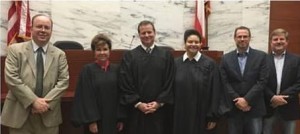
 Alpha Omega alleged that a law firm breached its responsibilities as an escrow agent. In ts findings of fact and conclusions of law, the trial court said: “11. Alpha Omega, Inc. did not prove by a preponderance of the credible evidence that a fiduciary relationship existed between it and the Defendants.” The Fifth Court disagreed, and then found harm because the trial court “did not evaluate the remaining elements of fiduciary breach under the proper legal standards” and “there was some evidence of the remaining elements of fiduciary breach, such that the trial court could have reached the opposite result had it not erred in finding 11.” Accordingly, it reversed and remanded. Alpha Omega CHL, Inc. v. Min, No. 05-15-00124-CV (June 16, 2016) (mem. op.)
Alpha Omega alleged that a law firm breached its responsibilities as an escrow agent. In ts findings of fact and conclusions of law, the trial court said: “11. Alpha Omega, Inc. did not prove by a preponderance of the credible evidence that a fiduciary relationship existed between it and the Defendants.” The Fifth Court disagreed, and then found harm because the trial court “did not evaluate the remaining elements of fiduciary breach under the proper legal standards” and “there was some evidence of the remaining elements of fiduciary breach, such that the trial court could have reached the opposite result had it not erred in finding 11.” Accordingly, it reversed and remanded. Alpha Omega CHL, Inc. v. Min, No. 05-15-00124-CV (June 16, 2016) (mem. op.)
I recently spoke at the University of Texas appellate course to provide an update on recent Fifth Circuit cases, here is my PowerPoint from that presentation.
 Rainier Income Fund I, Ltd. v. Gans presented an appeal from the district court’s confirmation of the rulings of a “special judge” appointed under chapter 151 of the Texas Civil Practice & Remedies Code. The appellant moved for a new trial before the district court; the appellee contended that it was not effective to extend the appellate deadline, as the district court’s power to grant a new trial in this posture is significantly limited by chapter 151. After a thorough review of the statute and the general principles surrounding the motion for new trial in Texas, the Fifth Court concluded that the motion was effective and the deadline was extended. In particular, it noted the Texas Supreme Court’s reminder in Old Republic Ins. Co. v. Scott, 846 S.W.2d 832, 833 (Tex. 1993) that: “The filing of a motion for new trial in order to extend the appellate timetable is a matter of right, whether or not there is any sound or reasonable basis for the conclusion that a further motion is necessary.” No. 05-00460-CV (June 7, 2016) (mem. op.)
Rainier Income Fund I, Ltd. v. Gans presented an appeal from the district court’s confirmation of the rulings of a “special judge” appointed under chapter 151 of the Texas Civil Practice & Remedies Code. The appellant moved for a new trial before the district court; the appellee contended that it was not effective to extend the appellate deadline, as the district court’s power to grant a new trial in this posture is significantly limited by chapter 151. After a thorough review of the statute and the general principles surrounding the motion for new trial in Texas, the Fifth Court concluded that the motion was effective and the deadline was extended. In particular, it noted the Texas Supreme Court’s reminder in Old Republic Ins. Co. v. Scott, 846 S.W.2d 832, 833 (Tex. 1993) that: “The filing of a motion for new trial in order to extend the appellate timetable is a matter of right, whether or not there is any sound or reasonable basis for the conclusion that a further motion is necessary.” No. 05-00460-CV (June 7, 2016) (mem. op.)
The appellate bar is still getting used to section 51.014(d) of the Civil Practice & Remedies Code, under which a “permissive” interlocutory appeal may proceed under certain circumstances. In Hartford Accident & Indemnity Co. v. Seagoville Partners, after initially granting leave to appeal under that section, the Fifth Court reconsidered whether the trial court had in fact made “a substantive ruling on a controlling question of law” as required by the statute. After thoroughly reviewing the procedural posture of the case, the Court concluded that the trial court could have also decided on the basis of whether the evidence was sufficient to raise a fact issue under the legal standard advocated by the appellant. Accordingly, it dismissed the appeal. No. 05-15-00760-CV (June 9, 2016) (mem. op.)
Court closed to survivor and wrongful death claims: Claims arising from young girl’s death were already barred by limitations months before her death.
April 27, 2016In Durham v. Children’s Medical Center of Dallas, the Dallas Court of Appeals decided an issue of first impression: If a 12-year-old receives medical treatment and dies more than two years after that treatment because of the negligence of the health care providers, does the Texas Constitution’s Open Courts Clause prevent the running of limitations for survival and wrongful death claims? The Dallas Court of Appeals concluded that the answer is no because the Open Courts Clause does not apply to statutorily created claims.
The facts are plainly tragic. A 12-year-old girl was injured in a car accident in Hawaii. During treatment, the doctors also diagnosed a dilation of the ascending aorta, which apparently was not related to the accident itself. The doctors recommended a follow-up with a cardiologist. The girl was transferred to Children’s Medical Center of Dallas for a short time before then being transferred to Scottish Rite, where she was treated for her injuries resulting from the accident. Unfortunately, there was not a follow-up on the information about her enlarged aorta. A little more than two years later, the girl died because her aorta ruptured. She was only 15 years old. The girl’s mother and the administrator of her estate brought wrongful death and survival claims. Summary judgment was granted based on the 2-year statute of limitations.
The Dallas Court of Appeals affirmed. It held that Civil Practice and Remedies Code § 74.251 applied, which requires claims to be filed within 2 years of the treatment that is the subject of the claim unless the child is younger than 12. Because the girl was 12 at the time of treatment, the exception did not apply and limitations began to run on the date of treatment for statutory causes of action, including wrongful death and survival claims. The Court then distinguished the Texas Supreme Court’s decision in Weiner v. Wasson, which held that limitations are unconstitutional as applied to minors under the Open Courts Clause of the Texas Constitution because they would cut off the minor’s cause of action before he reaches majority. The Dallas Court of Appeals held that the Open Courts Clause and Weiner v. Wasson could not save the survival and wrongful death claims because the Open Courts Clause does not apply to statutory claims, which include survival and wrongful death claims. As a result, the survival and wrongful death claims arising from the girl’s death were already barred by limitations months before her death.
Last Friday, blog publisher David Coale spoke about recent federal cases on sanctions and professional responsibility issues; for some ethics CLE self-study, here is the handout that he used.
 LPCH partner Britta Stanton, vice-Chair of the Dallas Bar Association Trial Skills Association, recently published this good article about Impeachment in Five Simple Steps under the Texas Rules of Evidence.
LPCH partner Britta Stanton, vice-Chair of the Dallas Bar Association Trial Skills Association, recently published this good article about Impeachment in Five Simple Steps under the Texas Rules of Evidence.
The oral argument in the high-profile partnership dispute of Enterprise Products Partners LP v. Energy Transfer Partners LP will proceed at 3:00 on Wednesday, April 20, 2016. (LPCH represents Appellee ETP.)
“How many legs does a dog have if you call his tail a leg? Four. Saying that a tail is a leg doesn’t make it a leg.” — Abraham Lincoln. The same can be said for usurious loans.
In Koch v. Boxicon, LLC, the Dallas Court of Appeals considered the appeal of Koch, a chiropractor, who was sued by Boxicon for breaching an agreement for the “purchase of future business income.” Boxicon had financed Koch’s business by paying Koch $96,000 over six months. In exchange, Koch was required to make “pay back payments” to Boxicon totaling $192,000 over two years. The defendant claimed agreement was a usurious loan while the defendant claimed the agreement wasn’t a loan at all because the recitals expressly stated the agreement “is NOT a loan.” The trial court allowed the jury to decide and entered a judgment in favor of the plaintiff. The Dallas Court of Appeals reversed and held that the agreement was usurious as a matter of law. Noting that courts look to the substance rather than the form of a transaction, the court held that agreement met the statutory definition of a loan and provided for an absolute obligation to repay the principal. Though the agreement stated it was a “purchase of a portion of the future cash stream generated by the business” and “is NOT a loan,” the agreement went on to state that “This is NOT an agreement to buy a percentage of the business, but for a fixed return upon capital invested by Buyer as per this agreement.” So, what is a loan agreement if you agree it isn’t a loan? A loan. Saying that it isn’t a loan doesn’t make it not a loan (regardless of your use of all caps).
Difference between Plaintiff’s breach of contract element and agency affirmative defense? It’s all in your head.
March 29, 2016In Tour de Force, Ltd. v. Barr, the plaintiff, Tour de Force, was a Russian tour operator that entered into an agreement by email with Gordon Barr, CEO of Port Promotions. There wasn’t a separate written contract. When Tour de Force stopped receiving payments, it sued Barr individually. The trial court found after a bench trial that Tour de Force did not prove that a contract existed with Barr in his individual capacity. Tour de Force appealed, arguing that the trial court applied the wrong standard because agency is an affirmative defense. The Dallas Court of Appeals affirmed.
On the issue of whether it was the defendant’s burden to prove agency or the plaintiff’s burden to prove a contract with the defendant in his individual capacity, the Court noted that the defendant disclaimed any reliance on an agency defense during closing, meaning he had no burden to establish an affirmative defense. “Rather, the burden remained squarely with [Tour de Force] to prove a ‘meeting of the minds’ between it and Barr to enter into a contract.” The emails forming the contract included a signature line of Gordon Barr as CEO of Port Promotions, invoices were directed at Port Promotions, and payments were made from an account owned by Port Promotions. Thus, though the plaintiff testified that he believed he had contracted with Barr, there was no evidence of a “meeting of the minds” between Tour de Force and Barr in his individual capacity to enter into a contract.
“Should have, could have, would have” not proper expert testimony—the Dallas Court of Appeals’ continued skepticism of expert opinions of what others would have done.
March 28, 2016Continuing its skepticism of expert opinions about how third parties would act under hypothetical situations (see Experts, show your work or it isn’t summary judgment evidence), the Dallas Court of Appeals affirmed a directed verdict in favor of the defendant in Axess International, Inc. v. Baker Botts, LLP based on the legal insufficiency of causation evidence. In that case, the plaintiff alleged that if Baker Botts had disclosed that it was pursuing similar patents on behalf of a competitor as well as the plaintiff, the plaintiff would have obtained different counsel, resulting in more favorable business terms in a deal with the competitor when conflict over the competing patents later came to a head.
At issue was an expert opinion from a patent attorney offered to show causation. He opined that the plaintiff would have initiated an interference proceeding and would have expanded its patent claims if the conflict had been disclosed, and that the result would have been a more favorable resolution between the plaintiff and the competitor. While noting that whether those two steps would have been taken was not clear, the Dallas Court of Appeals focused instead on whether there was evidence that those two steps would have resulted in a more favorable deal between the plaintiff and the competitor. The Court noted that because the expert offered no evidence of a similar case that was resolved favorably, there was no basis for the expert opinion that the plaintiff would have prevailed in the interference proceeding (heard this one before?). As to the expanded patent claims, the court held that the expert offered no factual basis to support his opinion as to how the USPTO would have responded to the hypothetical patent applications, again focusing on the lack of evidence regarding similar cases. And the court suggested it would be layering speculation upon speculation to assume that the mere threat of an interference proceeding or expanded patent claims would have resulted in a more favorable deal for the plaintiff without an indication as to the result of either. Thus, there was insufficient proximate cause evidence against Baker Botts and the trial court was affirmed.
Lesson learned (again): anytime your expert is saying what someone else would have done under alternative circumstances, the expert should identify specific similar factual scenarios that were considered by that third party that had the desired outcome. Otherwise, the expert’s testimony may be no evidence at all.
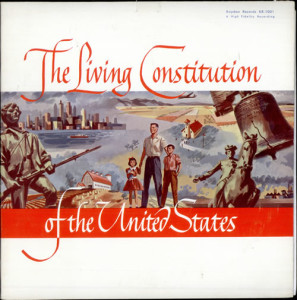 In University of Texas Southwestern Medical Center v. Munoz, the Dallas Court of Appeals for the second time considered whether sovereign immunity barred the plaintiff’s claims. At the interlocutory stage, the answer was “no.” After a trial on the merits, the Dallas Court of Appeals said “yes,” and judgment was rendered for the University.
In University of Texas Southwestern Medical Center v. Munoz, the Dallas Court of Appeals for the second time considered whether sovereign immunity barred the plaintiff’s claims. At the interlocutory stage, the answer was “no.” After a trial on the merits, the Dallas Court of Appeals said “yes,” and judgment was rendered for the University.
The issue in the case was whether the University had sovereign immunity from a suit arising from an injury caused by an air handling unit. If the air handling unit was personal property, the Texas Legislature waived immunity under the Texas Tort Claims Act. If it was a fixture attached to real property, then there was no waiver and the suit was barred because the plaintiff was aware of the danger.
In the first interlocutory appeal, the Dallas Court of Appeals held that the air handling unit was personal property, and thus the trial court had jurisdiction because sovereign immunity was waived. The plaintiff argued on the appeal of the final judgment that this was the law of the case. It was, after all, the same air handling unit discussed in the opinion from the interlocutory appeal.
The Dallas Court of Appeals disagreed. Noting that “[i]f the record in one appeal on a plea to the jurisdiction differs from the record on a second appeal following trial, we review the evidence challenging the existence of jurisdictional facts.” The court held that it was logical to assume the facts were better developed by the time of trial, and so it would consider those better developed facts. After reviewing those facts, the Dallas Court of Appeals concluded that the air handling unit was actually a fixture and reversed the final judgment in favor of the plaintiff. So governmental entities, despair not if you lose your interlocutory appeal, because it may turn out that the court trying your case does not have jurisdiction after all.
 The unfortunate plaintiff in K.W. Ministries v. Auction Credit Enterprises had trouble responding to the defendant’s summary judgment motions. They were set for hearing on September 15, 2014. On September 8, the plaintiff filed a response that addressed only one of the claims and included no evidence. Three days before the hearing, it filed a “Document Supplement” to its response, but not a motion seeking leave to file that supplement. Then, on the morning of the hearing, the plaintiff filed an amended response accompanied by an affidavit and other materials. At the hearing, its counsel asked the court to “receive my oral motion for leave to amend and accept our response to the summary judgment that was filed this morning.” Asked why he had not provided an affidavit to support the resp
The unfortunate plaintiff in K.W. Ministries v. Auction Credit Enterprises had trouble responding to the defendant’s summary judgment motions. They were set for hearing on September 15, 2014. On September 8, the plaintiff filed a response that addressed only one of the claims and included no evidence. Three days before the hearing, it filed a “Document Supplement” to its response, but not a motion seeking leave to file that supplement. Then, on the morning of the hearing, the plaintiff filed an amended response accompanied by an affidavit and other materials. At the hearing, its counsel asked the court to “receive my oral motion for leave to amend and accept our response to the summary judgment that was filed this morning.” Asked why he had not provided an affidavit to support the resp onse on the day it was due instead of that morning, counsel answered: “I don’t have a satisfactory answer for that, Your Honor.” The response was thus not considered, and the Fifth Court affirmed, using the plain language of the relevant rule of procedure to reject plaintiff’s arguments about why it should have been. No. 05-14-01392-CV (March 21, 2016) (mem. op.)
onse on the day it was due instead of that morning, counsel answered: “I don’t have a satisfactory answer for that, Your Honor.” The response was thus not considered, and the Fifth Court affirmed, using the plain language of the relevant rule of procedure to reject plaintiff’s arguments about why it should have been. No. 05-14-01392-CV (March 21, 2016) (mem. op.)
Celebrate St. Patrick’s Day with five recent cases to know from the Dallas Court of Appeals; click here to access the list and analysis. And watch out for leprechauns!
In Starwood Management, LLC v. Swaim, the Dallas Court of Appeals affirmed a summary judgment in favor of the defendant by holding that the plaintiff’s evidence of causation, an opinion from their expert witness, was conclusory and therefore not admissible summary judgment evidence. The opinion is a reminder that expert opinion evidence on summary judgment must be more than mere conclusions.
The facts of the case arose from plaintiff hiring the defendants, an attorney and his law firm, to recover an aircraft that was seized by the DEA for an allegedly illegal registration. The defendants were late in filing a claim with the DEA’s Forfeiture Counsel to recover the aircraft, causing the plaintiff’s federal claim for the aircraft to be dismissed. The affidavit offered by the plaintiff as evidence of causation was that of an attorney who had successfully represented the plaintiff in five previous aircraft seizure cases. His opinion was that if the plaintiff had timely filed its claim with the DEA such that the federal lawsuit would not have been dismissed, the DEA would have returned the aircraft as it had in those prior five case. The district court excluded the opinion and granted summary judgment in favor of the defendants.
The Dallas Court of Appeals affirmed because it held the expert’s opinion of causation was conclusory. Inexcusably passing on an opportunity to use one of this blogger’s favorite Latin phrases, ipse dixit, the Dallas Court of Appeals instead described the legal standard in less colorful but ultimately more helpful terms. “To avoid being conclusory, ‘[t]he expert must explain the basis of his statements to link his conclusions to the facts.’ An expert must also ‘[e]xplain how and why the negligence caused the injury.’” Or as I was told in math class, the expert must show his work. This expert failed to do that because, although he had past experience in other aircraft seizure cases in which the outcome was positive, he failed to describe the facts of those cases. As a result, he failed to link those cases to the one at hand, rendering his causation opinion a mere conclusion.
In In re Michelin North America, Inc., the Dallas Court of Appeals conditionally granted a writ of mandamus to protect Michelin from being forced to produce certain discovery. The district court ordered Michelin to produce specifications for tires similar to the allegedly defective tire at issue in that case in addition to financial information for the decade prior to the litigation.
The court of appeals held that Michelin satisfied its burden under Texas Rule of Evidence 507 to resist the discovery of trade secrets through the affidavit of an engineer who worked in Michelin’s legal department but that Michelin failed to satisfy its burden of proving its financial data was a trade secret because it failed to offer an affidavit until after the hearing on the motion to compel (helpful hint: it should be filed 7 days before the hearing under TRCP 193.4(a) if it is in affidavit form). The court also held that the plaintiffs failed to meet their burden under Rule 507 to show “with specificity” exactly how the lack of information would impair the presentation of the case on the merits “to the point that an unjust result is a real, rather than a merely possible, threat.” On the issue of financial information, though Michelin failed to timely prove its trade secrets privilege, Michelin was saved by a secondary argument that the district court’s order was too broad because the discovery included financial information from several years earlier and only current financial information is relevant for calculation of punitive damages.
AdvoCare filed a petition to take a Rule 202 deposition from Michael Moussa; Moussa, joined by Shereef Kamel, counterclaimed. AdvoCare obtained a $3,500 sanctions award against Kamel and his counsel related to that filing. They appealed, arguing that “AdvoCare never asserted any affirmative claim for relief in the suit, the rule 202 petition has been ‘superseded and rendered moot’ by the institution of arbitration proceedings initiated by AdvoCare against Moussa and Kamel, and their counterclaims are no longer pending because they have nonsuited the counterclaims.” The Fifth Court disagreed because no written order confirmed the nonsuit; accordingly, it dismissed for lack of appellate jurisdiction over an appealable final order. Kamel v. AdvoCare Int’l, L.P., No. 05-15-01295-CV (March 4, 2016) (mem. op.)
When is appealing a justice court judgment to county court not so appealing? When it causes damages to more than triple the $10,000 jurisdictional maximum “due to the passage of time.”
March 2, 2016Edwards Sims paid A-1 $5,000 for an engine he claimed was faulty, and A-1 refused to provide a refund. Sims filed a petition in justice court seeking total damages of about $7000, within the $10,000 jurisdictional limit. After A-1 failed to appear for trial, the justice court entered a judgment for $7155.
A-1 then appealed the judgment to county court. Sims amended his petition to seek additional damages, including rental fees incurred due to the passage of time, and attorney’s fees in county court. After A-1 failed to respond to requests for admission, which were deemed admitted, county court entered a judgment for $35,730, including $21,206 in damages, including additional damages “due to the passage of time,” and $14,384 in attorney’s fees.
On appeal, A-1 claimed that the county court’s judgment exceeded the jurisdiction maximum of $10,000 for small claims cases. The court of appeals recognized that when a case is originally filed in justice court and is appealed to the county court, the county court’s appellate jurisdiction is also restricted to the $10,000 maximum. But the court held that additional damages accrued “due to the passage of time” do not deprive the court of jurisdiction. The damages incurred after the justice court judgment and the attorney’s fees incurred in county court were due to the passage of time. Thus, the Dallas Court of Appeals affirmed a $35,730 judgment on a claim that when filed was subject to a $10,000 jurisdictional maximum.
In the otherwise unexceptional case of In re Thorpe, the Fifth Court augmented its customary citation when denying mandamus relief [“Ordinarily, to obtain mandamus relief, a relator must show both that the trial court has clearly abused its discretion and that relator has no adequate appellate remedy. In re: Prudential Ins. Co., 148 S.W.3d 124, 135–36 (Tex. 2004) (orig. proceeding)”] with an additional one: “Mandamus is not a substitute for appeal. In re: Bernson, 254 S.W.3d 594, 596 (Tex. App.–Amarillo 2008, orig. proceeding).” No. 05-16-00148-CV (Feb. 25, 2016) (mem. op.)
Appellants filed a bill of review about the dismissal of their case, but could not prove a lack of fault: “Because appellants failed to pursue all adequate legal remedies when they did not appeal the denial of [the] motion to reinstate, appellants could not plead and prove the third element of a bill of review.” McCurdy v. Oeftering, No. 05-14-01353-CV (Feb. 19, 2016) (mem. op.)
 Appellees sued Pak for breach of contract and won a judgment in their favor after a bench trial. Pak requested findings of fact and conclusions of law. Then, in a series of unfortunate events: the trial judge did not enter findings or conclusions; Pak filed a notice of past due findings and conclusions on December 31 — the judge’s last day in office — and the successor judge did not enter findings until January 12, after the period specified by the Rules. The panel majority reasoned that the successor judge (who did not participate in the trial) had no authority to make findings and conclusions, and that Pak did not have to object at the time to preserve his appellate complaint about them. It then found harm, reversed the judgment against Pak, and remanded for proceedings consistent with the opinion. A detailed dissent would have found a waiver on the specific facts and circumstances of the case, noting the original judge’s continued availability. Pak v. Ad Villarai, LLC, No. 05-14-01312-CV (Feb. 16, 2016) (mem. op.)
Appellees sued Pak for breach of contract and won a judgment in their favor after a bench trial. Pak requested findings of fact and conclusions of law. Then, in a series of unfortunate events: the trial judge did not enter findings or conclusions; Pak filed a notice of past due findings and conclusions on December 31 — the judge’s last day in office — and the successor judge did not enter findings until January 12, after the period specified by the Rules. The panel majority reasoned that the successor judge (who did not participate in the trial) had no authority to make findings and conclusions, and that Pak did not have to object at the time to preserve his appellate complaint about them. It then found harm, reversed the judgment against Pak, and remanded for proceedings consistent with the opinion. A detailed dissent would have found a waiver on the specific facts and circumstances of the case, noting the original judge’s continued availability. Pak v. Ad Villarai, LLC, No. 05-14-01312-CV (Feb. 16, 2016) (mem. op.)
 Schultz, owner of a chain of movie theaters, did not want to pay Banowsky, a licensed Texas attorney, for helping Schultz find a theater location. Schultz won summary judgment based on the Texas Real Estate Licensing Act, primarily because Banowsky admitted that his work did not involve legal services. The Fifth Court reversed: “[Schultz] argues that Banowsky’s construction of the Act is both unreasonable and favors the individual interest of an attorney over the interest in protecting the public from unlicensed, unscrupulous, or unqualified persons. But the fact remains that the plain language of the statute exempts attorneys from all requirements of the Act.” Banowsky v. Schultz, No. 05-14-01624-CV (Feb. 10, 2016) (mem. op.)
Schultz, owner of a chain of movie theaters, did not want to pay Banowsky, a licensed Texas attorney, for helping Schultz find a theater location. Schultz won summary judgment based on the Texas Real Estate Licensing Act, primarily because Banowsky admitted that his work did not involve legal services. The Fifth Court reversed: “[Schultz] argues that Banowsky’s construction of the Act is both unreasonable and favors the individual interest of an attorney over the interest in protecting the public from unlicensed, unscrupulous, or unqualified persons. But the fact remains that the plain language of the statute exempts attorneys from all requirements of the Act.” Banowsky v. Schultz, No. 05-14-01624-CV (Feb. 10, 2016) (mem. op.)
DFW Advisors sued its former bookkeeper, Ervin, alleging misappropriation. She responded to a request for disclosure by saying that she did acted with consent. At trial, she sought to introduce evidence of consent, in the form of testimony of an affair with DFW’s principal. The trial court allowed the testimony, over DFW’s objection, and the Fifth Court affirmed “[T]his response sufficiently disclosed Ervin’s basic defense, which was that she had consent to take the money. [Tex. R. Civ. P.] 194.2 only requires disclosure of a party’s basic assertions and did not require Ervin to disclose the details of how consent was given.” DFW Advisors Ltd. v. Ervin, No. 05-14-00883-CV (Feb. 11, 2016) (mem. op.)
The wrenching facts of the paternity dispute in In re: H.H. provide a rare example of when a finding of legally insufficient evidence can justify remand rather than rendition. The underlying rule, Tex. R. App. P. 43.3, requires that “When reversing a trial court’s judgment, the court must render the judgment that the trial court should have rendered, except when: (a) a remand is necessary for further proceedings; or (b) the interests of justice require a remand for another trial.” Under the rule, in the Fifth Court: “Remand is appropriate when, for any reason, a case has not been fully developed below.”
Here, the child “was barely a year old when the trial court entered the decree of termination and had been in the custody of TDFPS for almost her entire life, never at any time living with Father. . . . Father has been incarcerated since before learning he was potentially the biological father of H.H. and admits in his appellate brief that he remains incarcerated. However, there is no evidence in the record regarding when Father will be released or his ability to care for H.H. in a manner consistent with her interests. Additionally, neither Father nor his attorney appeared at the hearing[.]” Accordingly, ” a remand of the case against Father is appropriate to further develop the record and is in the interest of justice.” No. 05-15-01322-CV (Feb. 12, 2016) (mem. op.)
 Tunnell sued Archer for negligence after a truck accident involving Archer’s cattle. The trial court declined to dismiss Tunnell’s claim for failure to file an expert report under a statute related to claims against health care providers (Archer was a doctor), and Archer appealed that denial. After a Texas Supreme Court opinion clarified the underlying statute,Tunnell contended that Archer’s appeal not only no longer had merit, but had become frivolous and sanctionable.
Tunnell sued Archer for negligence after a truck accident involving Archer’s cattle. The trial court declined to dismiss Tunnell’s claim for failure to file an expert report under a statute related to claims against health care providers (Archer was a doctor), and Archer appealed that denial. After a Texas Supreme Court opinion clarified the underlying statute,Tunnell contended that Archer’s appeal not only no longer had merit, but had become frivolous and sanctionable.
After Archer continued with the appeal on other grounds, the Fifth Court agreed with Tunnell and sanctioned Archer and his counsel for the costs of the motion to dismiss: “After the supreme court’s opinion in Ross, there were no reasonable grounds for an advocate to believe the case could be reversed. However, appellants did not dismiss this frivolous appeal. Instead, appellants’ counsel filed a brief on the merits asserting  ERISA preemption based on non-existent orders that this Court lacked jurisdiction to consider. No reasonable counsel could believe the ERISA-preemption argument was a reasonable ground for reversal in this case when there was no written order on a motion asserting the argument and no statute permits an interlocutory appeal from such an order. In these circumstances, we conclude that appellants and their counsel’s actions are so egregious as to warrant the award to Tunnell of just damages from appellants and their counsel for their pursuit of this frivolous appeal.” Archer v. Tunnell, No. 05-15-00459-CV (Feb. 9, 2016) (mem. op.)
ERISA preemption based on non-existent orders that this Court lacked jurisdiction to consider. No reasonable counsel could believe the ERISA-preemption argument was a reasonable ground for reversal in this case when there was no written order on a motion asserting the argument and no statute permits an interlocutory appeal from such an order. In these circumstances, we conclude that appellants and their counsel’s actions are so egregious as to warrant the award to Tunnell of just damages from appellants and their counsel for their pursuit of this frivolous appeal.” Archer v. Tunnell, No. 05-15-00459-CV (Feb. 9, 2016) (mem. op.)
 Dharma and Hahn divorced. The trial court entered a final decree. Dharma appealed the trial court division of property; primarily, an interest in her medical practice. Hahn argued that she accepted the benefits of the decree by selling a related entity and encumbering the practice’s assets, and the Fifth Court agreed, finding that she “exercised control over substantial assets she received in the trial court’s property division.” The Court rejected an argument that the “acceptance of benefits” doctrine did not apply, based on her view of what would likely happen on remand, because that did not establish an “unquestionable” right as required by the limits on that doctrine. In re S.B.H., No. 05-14-00585-CV (Feb. 5, 2016) (mem. op.)
Dharma and Hahn divorced. The trial court entered a final decree. Dharma appealed the trial court division of property; primarily, an interest in her medical practice. Hahn argued that she accepted the benefits of the decree by selling a related entity and encumbering the practice’s assets, and the Fifth Court agreed, finding that she “exercised control over substantial assets she received in the trial court’s property division.” The Court rejected an argument that the “acceptance of benefits” doctrine did not apply, based on her view of what would likely happen on remand, because that did not establish an “unquestionable” right as required by the limits on that doctrine. In re S.B.H., No. 05-14-00585-CV (Feb. 5, 2016) (mem. op.)
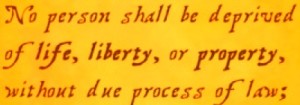 Self-explanatory: “Here, the record shows the trial court set the show cause hearing for November 12. The record does not contain any notice for any other hearing that day, nor does it contain notice of a final trial setting. Thus, while Pollard had reasonable notice that the issue before the trial court on November 12 was whether the independent executor should be removed, he had no notice that the hearing would result in a final determination of his homestead rights. To the extent the trial court considered and ruled Pollard abandoned his homestead rights in the Beverly Drive house or on any issues other than the show cause, the trial court erred. Because Pollard did not receive proper notice, his due process rights were violated, and we must reverse the trial court’s order.”
Self-explanatory: “Here, the record shows the trial court set the show cause hearing for November 12. The record does not contain any notice for any other hearing that day, nor does it contain notice of a final trial setting. Thus, while Pollard had reasonable notice that the issue before the trial court on November 12 was whether the independent executor should be removed, he had no notice that the hearing would result in a final determination of his homestead rights. To the extent the trial court considered and ruled Pollard abandoned his homestead rights in the Beverly Drive house or on any issues other than the show cause, the trial court erred. Because Pollard did not receive proper notice, his due process rights were violated, and we must reverse the trial court’s order.”
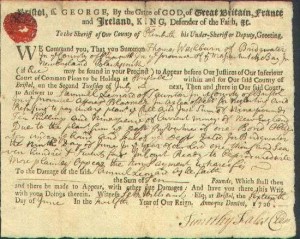 Echoing Justice Marshall’s classic head fake in Marbury v. Madison about jurisdiction, the case of In re Ralston Outdoor Advertising Ltd. offered a similar maneuver about Texas mandamus standards. After first expanding the Fifth Court’s usual citation to In re: Prudential Ins. Co., 148 S.W.3d 124 (Tex. 2004) to include its discussion of balancing (“An appellate remedy is ‘adequate’ when any benefits to mandamus review are outweighed by the detriments.”), the Court then denied mandamus relief based on longstanding pre-Prudential precedent : “Texas courts have long held that a plaintiff denied a default judgment has an adequate appellate remedy.” (citing Jackson v. McKinsey, 12 S.W.2d 1044, 1045 (Tex. Civ. App.—Fort Worth 1928, no writ)).
Echoing Justice Marshall’s classic head fake in Marbury v. Madison about jurisdiction, the case of In re Ralston Outdoor Advertising Ltd. offered a similar maneuver about Texas mandamus standards. After first expanding the Fifth Court’s usual citation to In re: Prudential Ins. Co., 148 S.W.3d 124 (Tex. 2004) to include its discussion of balancing (“An appellate remedy is ‘adequate’ when any benefits to mandamus review are outweighed by the detriments.”), the Court then denied mandamus relief based on longstanding pre-Prudential precedent : “Texas courts have long held that a plaintiff denied a default judgment has an adequate appellate remedy.” (citing Jackson v. McKinsey, 12 S.W.2d 1044, 1045 (Tex. Civ. App.—Fort Worth 1928, no writ)).
 The Fifth Court continues to carefully police the boundaries of judicial admissions. In a family law case, it observed: “In her original motion to modify, Mother did not request the amount of child support be modified; rather she requested only that the order be modified to impose greater restrictions on Father’s access to [Child]. Therefore, Mother’s statement there had been a material and substantial change in circumstances was directed toward possession of and access to J.C.J., not the previously ordered child support. Accordingly, Mother did not make a ‘clear, deliberate, and unequivocal’ statement in her original motion to modify that there had been a material and substantial change in circumstances relating to Father’s financial condition or to the amount of child support Father had been ordered to pay.” In re JCJ, No. 05-14-01449-CV (Jan. 28, 2016) (mem. op.) (applying Horizon/CMS Healthcare Corp. v. Auld, 34 S.W.3d 887, 905 (Tex. 2000)).
The Fifth Court continues to carefully police the boundaries of judicial admissions. In a family law case, it observed: “In her original motion to modify, Mother did not request the amount of child support be modified; rather she requested only that the order be modified to impose greater restrictions on Father’s access to [Child]. Therefore, Mother’s statement there had been a material and substantial change in circumstances was directed toward possession of and access to J.C.J., not the previously ordered child support. Accordingly, Mother did not make a ‘clear, deliberate, and unequivocal’ statement in her original motion to modify that there had been a material and substantial change in circumstances relating to Father’s financial condition or to the amount of child support Father had been ordered to pay.” In re JCJ, No. 05-14-01449-CV (Jan. 28, 2016) (mem. op.) (applying Horizon/CMS Healthcare Corp. v. Auld, 34 S.W.3d 887, 905 (Tex. 2000)).
 A high-profile fee dispute led to holdings that (1) an attorney can recover in quantum meruit in connection with an oral contingent fee agreement, notwithstanding the other legal problems with such agreements; (2) legally sufficient evidence of the attorney’s “valuable compensable global settlement services” supported the verdict on his quantum meruit theory; (3) claimed error on the narrow scope of a fiduciary duty instruction was not preserved without a specific objection to the scope issue; and (4) the trial court did not abuse its discretion in refusing a spoliation instruction, when evidence showed that the destruction of the relevant emails resulted from a routine upgrade process. Shamoun & Norman, LLP v. Hill, No. 05-13-01634-CV (Jan. 26, 2016). The Court rendered judgment on quantum meruit.
A high-profile fee dispute led to holdings that (1) an attorney can recover in quantum meruit in connection with an oral contingent fee agreement, notwithstanding the other legal problems with such agreements; (2) legally sufficient evidence of the attorney’s “valuable compensable global settlement services” supported the verdict on his quantum meruit theory; (3) claimed error on the narrow scope of a fiduciary duty instruction was not preserved without a specific objection to the scope issue; and (4) the trial court did not abuse its discretion in refusing a spoliation instruction, when evidence showed that the destruction of the relevant emails resulted from a routine upgrade process. Shamoun & Norman, LLP v. Hill, No. 05-13-01634-CV (Jan. 26, 2016). The Court rendered judgment on quantum meruit.
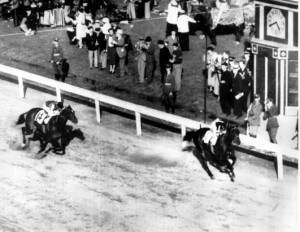 It really can happen in the appeal of a temporary injunction — “If, while on appeal of the granting or denying of the temporary injunction, the trial court renders final judgment, the case on appeal becomes moot.” Santiago v. Bank of New York (Jan. 25, 2016) (mem. op.) (citing Isuani v. Manske-Sheffield Radiology Group, P.A., 802 S.W.2d 235, 236 (Tex. 1991) (per curiam)).
It really can happen in the appeal of a temporary injunction — “If, while on appeal of the granting or denying of the temporary injunction, the trial court renders final judgment, the case on appeal becomes moot.” Santiago v. Bank of New York (Jan. 25, 2016) (mem. op.) (citing Isuani v. Manske-Sheffield Radiology Group, P.A., 802 S.W.2d 235, 236 (Tex. 1991) (per curiam)).
Graman v. Graman involved a contentious dispute about the operation of a family restaurant business. On a fraud claim related to a loan, a witness testified to a conversation with the defendant: “We ended up talking about his loans his parents made to him and he told me that he never intended to pay his parents back at that point in time . . . He told me that he never intended on paying them back — and that’s why he never signed on what I recall him telling me was approximately $850,000. Finding that the first statement was not evidence of the defendant’s intent at the time of the loans, the Fifth Court then found: “As for the second statement, a fact finder could determine that statement showed Jason’s intent at the time of all the loans,” and reversed a no-evidence summary judgment on this claim. No. 05-14-01254-CV (Jan. 20, 2016) (mem. op.)
The issue in Tempay, Inc. v. Tanintco, Inc. was whether a notice of assignment, required to be sent to an account debtor as part of a factoring arrangement, satisfied section 9.406 of the UCC. That provision requires that the notice “reasonably identify the rights assigned,” and courts have divided about exactly what it requires, and whether summary judgment is appropriate. Here, in an analysis of broader interest about the appropriate standards for summary judgment, the Fifth Court found fact issues about the adequacy of the notice and whether it had been revoked. No. 05-15-00130-CV (Jan. 15, 2016) (mem. op.)
Highland Capital sued the Looper Reed law firm, who represented a former employee in litigation with Highland, alleging that the firm committed several torts against Highland during the course of that representation. The Fifth Court affirmed the dismissal of those claims on immunity grounds: “[T]he actions themselves—acquiring documents from a client that are the subject of litigation against the client, reviewing the documents, copying the documents, retaining custody of the documents, analyzing the documents, making  demands on the client’s behalf, advising a client to reject counter-demands, speaking about an opposing party in a negative light, advising a client on a course of action, and even threatening particular consequences such as disclosure of confidential information if demands are not met—are the kinds of actions that are part of the discharge of an attorney’s duties in representing a party in hard-fought litigation.” Highland Capital Management LP v. Looper Reed & McGraw, PC, No. 05-15-00055-CV (Jan. 14, 2016) (mem. op.) (applying Cantey Hanger, LLP v. Byrd, 467 S.W.3d 477, 481 (Tex. 2015)).
demands on the client’s behalf, advising a client to reject counter-demands, speaking about an opposing party in a negative light, advising a client on a course of action, and even threatening particular consequences such as disclosure of confidential information if demands are not met—are the kinds of actions that are part of the discharge of an attorney’s duties in representing a party in hard-fought litigation.” Highland Capital Management LP v. Looper Reed & McGraw, PC, No. 05-15-00055-CV (Jan. 14, 2016) (mem. op.) (applying Cantey Hanger, LLP v. Byrd, 467 S.W.3d 477, 481 (Tex. 2015)).
After a deadly 18-wheeler accident, the trucking company “decided to have the remains of the tractor and part of the trailer cut in half and crushed.” The district court allowed a spoliation instruction in the subsequent litigation, and the Fifth Court affirmed, noting: “the severity of the crash, [the CEO’s] years of experience in the industry, his previous dealings with obtaining police reports, and his awareness to preserve the [electronic control mechanism].” That said, particularly given the company’s protection by the workers’ compensation statutes, the death penalty sanctions entered by the district court did not have a “direct relationship” to that destruction. In re: J. H. Walker Inc., No. 05-14-01497-CV (Jan. 15, 2016) (mem. op.) This opinion presents a thoughtful application of the Texas Supreme Court’s recent analysis of spoliation in Brookshire Brothers, Ltd. v. Aldridge, 438 S.W.2d 9 (Tex. 2014).
 In recently dismissing an appeal, the Fifth Court reminded that as a “fictional legal person,” “a corporation may only appear through an attorney” in court proceedings, and summarized the cases on this point. Temple of the Supreme Mother Goddess Mahadevi Shakit of America, Corp. v. Wells Fargo Bank N.A., No. 05-15-01289-CV (Jan. 8, 2016) (mem. op.)
In recently dismissing an appeal, the Fifth Court reminded that as a “fictional legal person,” “a corporation may only appear through an attorney” in court proceedings, and summarized the cases on this point. Temple of the Supreme Mother Goddess Mahadevi Shakit of America, Corp. v. Wells Fargo Bank N.A., No. 05-15-01289-CV (Jan. 8, 2016) (mem. op.)
After the Texas Supreme Court’s reversed the Fifth Court’s analysis of a shareholder oppression claim in Ritchie v. Rupe, 443 S.W.3d 856 (Tex. 2014), it remanded for consideration of a parallel “informal fiduciary duty” claim. On remand, the Fifth Court rejected that claims, concluding: (1) standing alone, “evidence of domination and control” by the majority shareholder would not establish the necessary duty, and (2) the various familial and business relationships between the plaintiff and the defendants were not enough to establish a relationship of trust and confidence, notwithstanding the interaction of various family trusts over the years. Ritchie v. Rupe, No. 05-08-00615-CV (Jan. 12, 2016) (mem. op.)
Plaintiffs sought damages for losing a telecommunication contract with DISD. The defendants argued that, in the absence of any evidence of acts of fraudulent concealment, limitations should run from 2006 when Plaintiffs received their last payment. The Fifth Court agreed, rejecting Plaintiffs’ counterargument that limitations did not begin to run until the federal agency overseeing the contract had completed its investigation of the situation. Lazo Technologies v. Hewlett-Packard, No. 05-14-01060-CV (Jan. 7, 2016) (mem. op.)
After the second mediation of a wrongful death case failed to yield a settlement, the trial judge ordered the Chief Claims Officer (a resident of Alabama not otherwise involved in the case) of the defendant’s carrier (a nonparty) to appear at a show cause hearing. The Fifth Court granted a mandamus petition about that order: “[W]e conclude the judge lacked jurisdiction to order Thomas, a non-party who did not attend either mediation and who lives outside the trial court’s subpoena range, to appear and explain why ProAssurance should not be sanctioned.” In re ProAssurance Ins. Co., No. 05-15-01256-CV (Jan. 4, 2016) mem. op.)
 A business involved in the fuel purchases of a convenience store (right) obtained a $344,000 default judgment against an individual involved with the store’s operations. The Fifth Court set aside the judgment under the Craddock factors. As to the first factor (conscious indifference), the Court reminded of the importance of evidence rulings: “Although Quik-Way objected to the affidavits and other evidence filed in support of the motion for new trial, it did not secure any rulings on its objections; thus, we consider all the evidence in support of the motion for new trial” On the merits, the defendant “explained that her sister . . . handled the financial and personnel matters in the business and was the day manager of the store. After they were sued, [the sister] said she would handle the lawsuit. According to [the defendant], [the sister] was more educated and did not have a full-time outside job. [The defendant] said she relied on her sister and believed a lawyer had been hired and that an answer had been filed.” The sister filed a confirming affidavit. This showing sufficed: “A party’s belief that she had taken the appropriate steps to hire counsel is not consciously indifferent conduct, nor does it show [the defendant] knew she was being sued but did not care.” Khwaja v. Quik-Way Retail Associates II, Ltd., No. 05-14-01090-CV (Dec. 28, 2015) (mem. op.)
A business involved in the fuel purchases of a convenience store (right) obtained a $344,000 default judgment against an individual involved with the store’s operations. The Fifth Court set aside the judgment under the Craddock factors. As to the first factor (conscious indifference), the Court reminded of the importance of evidence rulings: “Although Quik-Way objected to the affidavits and other evidence filed in support of the motion for new trial, it did not secure any rulings on its objections; thus, we consider all the evidence in support of the motion for new trial” On the merits, the defendant “explained that her sister . . . handled the financial and personnel matters in the business and was the day manager of the store. After they were sued, [the sister] said she would handle the lawsuit. According to [the defendant], [the sister] was more educated and did not have a full-time outside job. [The defendant] said she relied on her sister and believed a lawyer had been hired and that an answer had been filed.” The sister filed a confirming affidavit. This showing sufficed: “A party’s belief that she had taken the appropriate steps to hire counsel is not consciously indifferent conduct, nor does it show [the defendant] knew she was being sued but did not care.” Khwaja v. Quik-Way Retail Associates II, Ltd., No. 05-14-01090-CV (Dec. 28, 2015) (mem. op.)
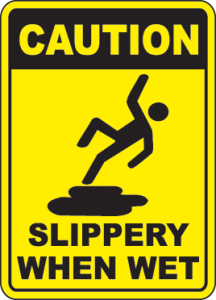 “Branch” Warren, a noted professional bodybuilder, tore a leg muscle when he slipped on a rainy ramp outside a TGI Friday’s restaurant. He proffered expert testimony from an architect named Peter Combs who, after inspecting the ramp roughly three months after the accident, opined that it was unsafe. The Fifth Court affirmed summary judgment for the defendant: “[A] fatal problem with the Combs affidavit is that Combs did not say what the ramp’s condition was when Warren fell. Combs did not say that the ramp was probably as slippery on August 20 (when Warren fell) as it was on December 4 (when Combs inspected the ramp). He did not say that the lapse of time and exposure to the elements made the ramp more slippery, less slippery, or had no effect on the ramp’s slipperiness. In short, Combs’s affidavit addressed the ramp’s condition only on the day he examined it.” Warren v. Carlson Restaurants, No. 05-14-01232-CV (Dec. 30, 2015) (mem. op.)
“Branch” Warren, a noted professional bodybuilder, tore a leg muscle when he slipped on a rainy ramp outside a TGI Friday’s restaurant. He proffered expert testimony from an architect named Peter Combs who, after inspecting the ramp roughly three months after the accident, opined that it was unsafe. The Fifth Court affirmed summary judgment for the defendant: “[A] fatal problem with the Combs affidavit is that Combs did not say what the ramp’s condition was when Warren fell. Combs did not say that the ramp was probably as slippery on August 20 (when Warren fell) as it was on December 4 (when Combs inspected the ramp). He did not say that the lapse of time and exposure to the elements made the ramp more slippery, less slippery, or had no effect on the ramp’s slipperiness. In short, Combs’s affidavit addressed the ramp’s condition only on the day he examined it.” Warren v. Carlson Restaurants, No. 05-14-01232-CV (Dec. 30, 2015) (mem. op.)
 Appellant complained that the trial judge had further proceedings after a nonsuit. While also affirming as to whether a nonsuit occurred (finding that one did not happen), the Fifth Court reminded of the importance of timely objection: ” Generally, to preserve a complaint for appellate review, a party must timely present the complaint to the trial court and seek a ruling on the complaint . . . . In this case, not only did appellants not object when the case was reinstated, they affirmatively indicated that they did not object. As a result, this issue was not preserved for appellate review.” Gonzalez v. Gonzalez, No. 05-14-01361-CV (Dec. 29, 2015) (mem. op.)
Appellant complained that the trial judge had further proceedings after a nonsuit. While also affirming as to whether a nonsuit occurred (finding that one did not happen), the Fifth Court reminded of the importance of timely objection: ” Generally, to preserve a complaint for appellate review, a party must timely present the complaint to the trial court and seek a ruling on the complaint . . . . In this case, not only did appellants not object when the case was reinstated, they affirmatively indicated that they did not object. As a result, this issue was not preserved for appellate review.” Gonzalez v. Gonzalez, No. 05-14-01361-CV (Dec. 29, 2015) (mem. op.)
 In a companion to the high-profile libel case of Tatum v. Dallas Morning News, the Fifth Court addressed the “anti-SLAPP” dismissal of the Tatum’s suit against Julie Hersh, a book author who allegedly discussed the subject of the offending column with columnist Steve Blow. For purposes of the motion, the Court assumed that “Hersh admitted talking with Blow about suicide and secrecy in general, but . . . denied making the alleged statements that the Tatums based their claims on—statements about [their son’s] death and obituary that encouraged Blow to write critically about those facts.” Based on those facts, the Court reversed dismissal, finding that its holding in Pickens v. Cordia,
In a companion to the high-profile libel case of Tatum v. Dallas Morning News, the Fifth Court addressed the “anti-SLAPP” dismissal of the Tatum’s suit against Julie Hersh, a book author who allegedly discussed the subject of the offending column with columnist Steve Blow. For purposes of the motion, the Court assumed that “Hersh admitted talking with Blow about suicide and secrecy in general, but . . . denied making the alleged statements that the Tatums based their claims on—statements about [their son’s] death and obituary that encouraged Blow to write critically about those facts.” Based on those facts, the Court reversed dismissal, finding that its holding in Pickens v. Cordia, 433 S.W.3d 179 (Tex. App.–Dallas 2014, no pet.), controlled when “the defendant’s motion admits participating in a conversation generally but denies making the specific relevant statements in particular.” Tatum v. Hersh, No. 05-14-01318-CV (Dec. 30, 2015).
433 S.W.3d 179 (Tex. App.–Dallas 2014, no pet.), controlled when “the defendant’s motion admits participating in a conversation generally but denies making the specific relevant statements in particular.” Tatum v. Hersh, No. 05-14-01318-CV (Dec. 30, 2015).
 In a detailed analysis, the Fifth Court reversed a summary judgment for the Dallas Morning News and columnist Steve Blow as to this 2010 column in the case of Tatum v. Dallas Morning News, No. 05-14-01017-CV (Dec. 30, 2015). In a nutshell, the plaintiffs took issue with Blow’s suggestion that they were untruthful about the circumstances of their son’s suicide. The Court found genuine issues of material fact about whether the column was about the Tatums (it did not expressly name them); whether it was defamatory, substantially true, or privileged; whether it solely involved opinion; and whether Blow acted with malice. The News’s own coverage of the opinion appears here.
In a detailed analysis, the Fifth Court reversed a summary judgment for the Dallas Morning News and columnist Steve Blow as to this 2010 column in the case of Tatum v. Dallas Morning News, No. 05-14-01017-CV (Dec. 30, 2015). In a nutshell, the plaintiffs took issue with Blow’s suggestion that they were untruthful about the circumstances of their son’s suicide. The Court found genuine issues of material fact about whether the column was about the Tatums (it did not expressly name them); whether it was defamatory, substantially true, or privileged; whether it solely involved opinion; and whether Blow acted with malice. The News’s own coverage of the opinion appears here.
 While the Wilburns submitted the highest price at a real estate auction, it was below the reserve price set by the bank who was auctioning the property. They nevertheless sought to enforce a right to the property. The Dallas Court affirmed a take-nothing verdict for the defendants. As to the auctioneer’s actual authority, the Court noted the instructions about reserve price in the “Agreement to Conduct Auction Sale.” As to his apparent authority, the Court noted the auctioneer’s statements at the start of the auction and the Wilburns’ signatures on two cards that said what a reserve price was and referenced the auctioneer’s contract: “None of the bank’s actions or inactions clothed the auctioneer with the indicia of authority to sell the Property at a price below the reserve without Valliance’s consent.” Wilburn v. Valliance Bank, No. 05-14-00965-CV (Dec. 21, 2015) (mem. op.)
While the Wilburns submitted the highest price at a real estate auction, it was below the reserve price set by the bank who was auctioning the property. They nevertheless sought to enforce a right to the property. The Dallas Court affirmed a take-nothing verdict for the defendants. As to the auctioneer’s actual authority, the Court noted the instructions about reserve price in the “Agreement to Conduct Auction Sale.” As to his apparent authority, the Court noted the auctioneer’s statements at the start of the auction and the Wilburns’ signatures on two cards that said what a reserve price was and referenced the auctioneer’s contract: “None of the bank’s actions or inactions clothed the auctioneer with the indicia of authority to sell the Property at a price below the reserve without Valliance’s consent.” Wilburn v. Valliance Bank, No. 05-14-00965-CV (Dec. 21, 2015) (mem. op.)
 Tervita LLC unsuccessfully disputed Sutterfield’s workers compensation claim in a contested hearing; afterwards, Sutterfield sued Tervita for various torts relating to its handling of his claim. The trial court denied Tervita’s motion to dismiss under the new Texas anti-SLAPP statute. The Dallas Court of Appeals reversed as to Sutterfield’s claims based on Tervita’s participation in the agency hearing, concluding that those claims were based on Tervita’s exercise of its right to petition. It otherwise affirmed, concluding that Sutterfield’s claims about a hostile work environment and wrongful discharge “are based on Tervita’s actions and statements outside of the TDI-WC proceeding.” Tervita LLC v. Sutterfield, No. 05-15-00479-CV (Dec. 18, 2015).
Tervita LLC unsuccessfully disputed Sutterfield’s workers compensation claim in a contested hearing; afterwards, Sutterfield sued Tervita for various torts relating to its handling of his claim. The trial court denied Tervita’s motion to dismiss under the new Texas anti-SLAPP statute. The Dallas Court of Appeals reversed as to Sutterfield’s claims based on Tervita’s participation in the agency hearing, concluding that those claims were based on Tervita’s exercise of its right to petition. It otherwise affirmed, concluding that Sutterfield’s claims about a hostile work environment and wrongful discharge “are based on Tervita’s actions and statements outside of the TDI-WC proceeding.” Tervita LLC v. Sutterfield, No. 05-15-00479-CV (Dec. 18, 2015).
 The Hales sued their homebuilder for fraud and violation of the DTPA, alleging serious problems with the foundation of their Rockwall home (right). They substantially succeeded at trial, and the Dallas Court of Appeals affirmed in large part in Bishop Abbey Homes, Ltd. v. Hale, No. 05-14-00137-CV (Dec. 16, 2015) (mem. op.) In particular, the Court affirmed as to limitations – a significant issue in this long-simmering dispute – noting that “each time the Hales raised a concern about the foundation, they were assured by one of appellants’ experts that the foundation was not the cause of the problems the Hales observed.” The court also affirmed as to sufficiency challenges to liability, several claims of improper closing argument, and a challenge to the the basis of the exemplary damages award based on constitutional and Kraus factors. The court requested a remittitur as to (a) mental anguish damages (for sufficiency reasons) above $208,856 per plaintiff; and (b) a portion of the additional/exemplary damages award, based on the applicable cap and the conclusion that the total award “exceeds the guidelines set forth in [Bennett v. Reynolds, 315 S.W.3d 867 (Tex. 2010)] and [Tony Gullo Motors I, LP v. Chapa, 212 S.W.3d 299 (Tex. 2006)] for the type of harm suffered by the Hales as a result of appellants’ conduct.”
The Hales sued their homebuilder for fraud and violation of the DTPA, alleging serious problems with the foundation of their Rockwall home (right). They substantially succeeded at trial, and the Dallas Court of Appeals affirmed in large part in Bishop Abbey Homes, Ltd. v. Hale, No. 05-14-00137-CV (Dec. 16, 2015) (mem. op.) In particular, the Court affirmed as to limitations – a significant issue in this long-simmering dispute – noting that “each time the Hales raised a concern about the foundation, they were assured by one of appellants’ experts that the foundation was not the cause of the problems the Hales observed.” The court also affirmed as to sufficiency challenges to liability, several claims of improper closing argument, and a challenge to the the basis of the exemplary damages award based on constitutional and Kraus factors. The court requested a remittitur as to (a) mental anguish damages (for sufficiency reasons) above $208,856 per plaintiff; and (b) a portion of the additional/exemplary damages award, based on the applicable cap and the conclusion that the total award “exceeds the guidelines set forth in [Bennett v. Reynolds, 315 S.W.3d 867 (Tex. 2010)] and [Tony Gullo Motors I, LP v. Chapa, 212 S.W.3d 299 (Tex. 2006)] for the type of harm suffered by the Hales as a result of appellants’ conduct.”
 In the mandamus case of In re Fort Apache Energy Inc., the relators sought relief from a trial setting in Dallas County, alleging that it interfered with the dominant jurisdiction (and slightly later trial setting) of the Kendall County Court. No. 05-15-00159-CV (Dec. 16, 2015). The Dallas Court of Appeals denied the petition, finding that the setting did not “amount[] to the kind of direct interference . . . that warrants mandamus relief under currently governing law.” (citing, inter alia, Abor v. Black, 695 S.W.2d 564, 566 (Tex. 1985) (orig. proceeding). In a classic disagreement about the scope and role of mandamus proceedings, a dissent would grant relief, arguing that “refusal to correct the trial court’s clear abuse of discretion by mandamus presents a strong likelihood of wasted public and private resources alike.” The Texas Supreme Court has since accepted a mandamus petition in, and set oral argument for, a similar case, also from Dallas.
In the mandamus case of In re Fort Apache Energy Inc., the relators sought relief from a trial setting in Dallas County, alleging that it interfered with the dominant jurisdiction (and slightly later trial setting) of the Kendall County Court. No. 05-15-00159-CV (Dec. 16, 2015). The Dallas Court of Appeals denied the petition, finding that the setting did not “amount[] to the kind of direct interference . . . that warrants mandamus relief under currently governing law.” (citing, inter alia, Abor v. Black, 695 S.W.2d 564, 566 (Tex. 1985) (orig. proceeding). In a classic disagreement about the scope and role of mandamus proceedings, a dissent would grant relief, arguing that “refusal to correct the trial court’s clear abuse of discretion by mandamus presents a strong likelihood of wasted public and private resources alike.” The Texas Supreme Court has since accepted a mandamus petition in, and set oral argument for, a similar case, also from Dallas.
One Technologies (“OT”) sued Profini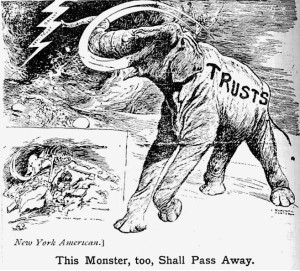 ty and a former OT employee for breach of a noncompetition agreement. Profinity counterclaimed for violations of the Texas antitrust statute. The jury found against OT and for Profinity; the trial judge adopted the verdict as to OT’s claims and granted JNOV on Profinity’s. The Dallas Court of Appeals affirmed, changing only the basis for resolution of the antitrust claim. Profinity LLC v. One Technologies, LP, No. 05-14-00403-CV (Dec. 17, 2015) (mem. op.)
ty and a former OT employee for breach of a noncompetition agreement. Profinity counterclaimed for violations of the Texas antitrust statute. The jury found against OT and for Profinity; the trial judge adopted the verdict as to OT’s claims and granted JNOV on Profinity’s. The Dallas Court of Appeals affirmed, changing only the basis for resolution of the antitrust claim. Profinity LLC v. One Technologies, LP, No. 05-14-00403-CV (Dec. 17, 2015) (mem. op.)
As to OT’s claim, the Court found no conclusive proof the element of damage, noting that Profinity’s damages expert had squarely clashed with OT’s expert at trial. As to the antitrust claims, the Court expressed considerable skepticism about Profinity’s damages model, which calculated the value of lost customers nationwide. Under Coca-Cola Co. v. Harmar Bottling Co., 218 S.W.3d 671 (Tex. 2006), because “remedying extraterritorial injury . . . would provide no benefit to consumers ‘in state,'” even allegations of anticompetitive conduct in Texas toward a company based in Texas are likely not actionable under the Texas statute. The Court did not rule on this basis, however, instead finding a lack of jurisdiction under the Noerr-Pennington doctrine, as the alleged anticompetitive conduct focused on “conduct ‘incidental’ to the prosecution of a lawsuit respecting [antitrust] redress.” (citing Noell v. City of Carrollton, 431 S.W.3d 682, 708 (Tex. App.–Dallas 2014, pet. denied).
 While otherwise affirming the plaintiffs’ victory in an easement dispute, the Dallas Court of Appeals struck a portion of the trial court’s declaratory judgment related to the legal rights associated with that easement. The Court found no request for judgment on that matter in the plaintiffs’ live pleading or summary judgment motion, and also found that general discussion of the applicable city regulations had been offered for other purposes. The Court reminded: “[A]n issue is not tried by consent when evidence relevant to the unpleaded issue is also relevant to a pleaded issue because admitting that evidence would not be calculated to elicit an objection and its admission would not prove the parties’ ‘clear intent’ to try the unpleaded issue.” United Services Pyramid Group v. Hurt, Noi. 05-14-00108-CV (Dec. 7, 2015) (mem. op.)
While otherwise affirming the plaintiffs’ victory in an easement dispute, the Dallas Court of Appeals struck a portion of the trial court’s declaratory judgment related to the legal rights associated with that easement. The Court found no request for judgment on that matter in the plaintiffs’ live pleading or summary judgment motion, and also found that general discussion of the applicable city regulations had been offered for other purposes. The Court reminded: “[A]n issue is not tried by consent when evidence relevant to the unpleaded issue is also relevant to a pleaded issue because admitting that evidence would not be calculated to elicit an objection and its admission would not prove the parties’ ‘clear intent’ to try the unpleaded issue.” United Services Pyramid Group v. Hurt, Noi. 05-14-00108-CV (Dec. 7, 2015) (mem. op.)



